Best Baby Wipes Guide 2022
Written by:
Maia James
10/27/2022
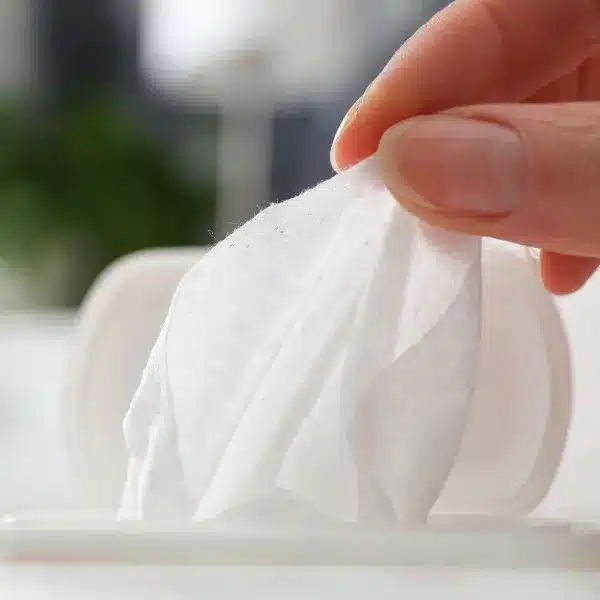
Updated: 04/22/2024
Looking for a different guide? Browse them all HERE.
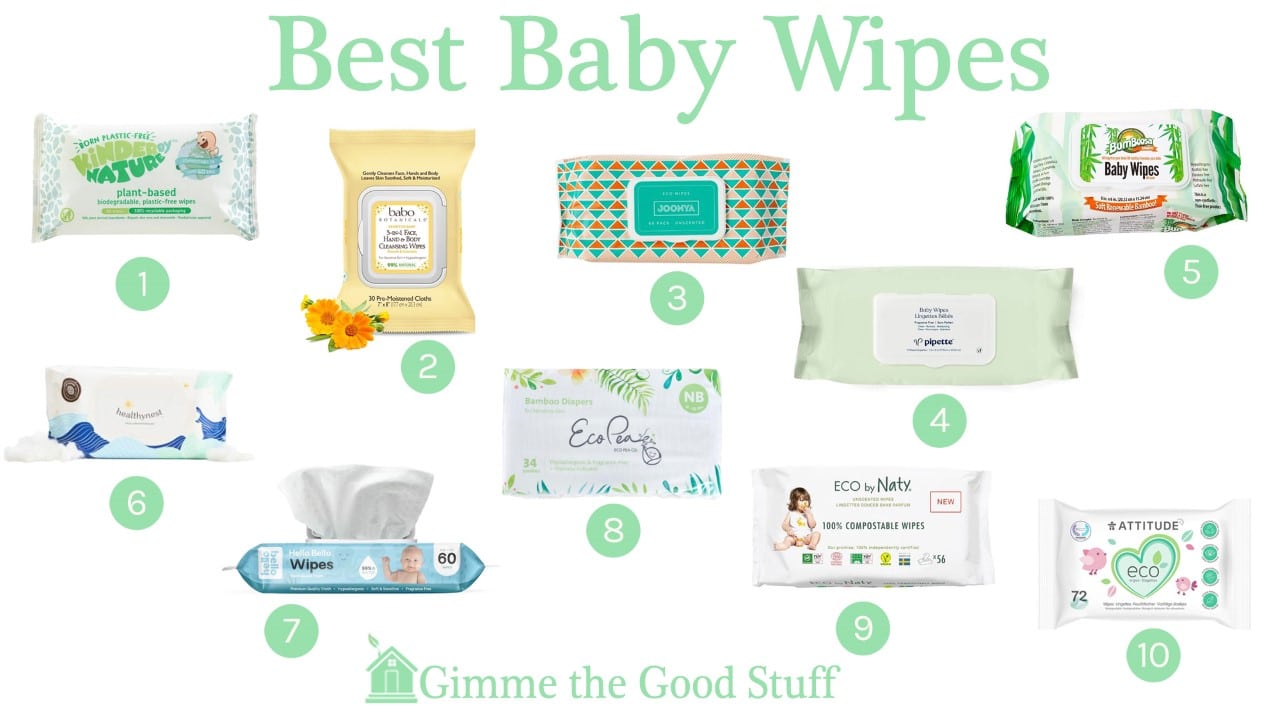
1. Jackson Reece / 2. Babo Botanicals / 3. Joonya / 4. Pipette / 5. Bum Boosa / 6. healthybaby / 7. Hello Bello / 8. Eco Pea / 9. Eco by Naty / 10. Attitude
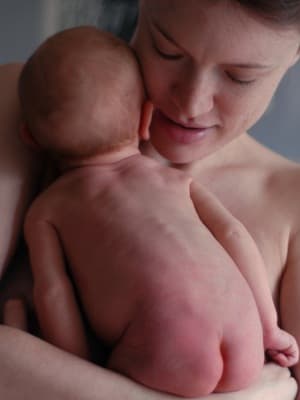
With research provided by Michael Hopkins, PhD
When I became a mother, I didn’t intend to use baby wipes at all. I assumed that in addition to exclusive cloth diaper usage, I’d be employing a washcloth and warm water at changing time.
Um, yeah. As soon as I experienced the convenience of the disposable wipe, wringing out poopy rags was a thing of the past. So I set out to find the best non-toxic baby wipes on the market.
It’s important to find the cleanest baby wipe for several reasons:
- The frequency with which we use baby wipes–multiples times a day, every day, for years!
- Baby wipes are used on the most delicate area of a baby, and we don’t wash the area off after use, so all ingredients are absorbed into baby’s skin.
- Baby wipes represent a huge environmental burden, even forming a reef in the river Thames! We owe it to our planet to choose the most environmentally friendly wipe possible.
The good news is that the ingredients in baby wipes are definitely much better now than when I wrote the first version of this guide ten years ago. Back then, fragrance and parabens were in most brands of wipes. Those ingredients are now much less common. And more and more brands are moving away from plastic and toward plant-based materials. This is good news for babies and for the Earth!
Ingredients to Avoid in Organic Baby Wipes
If you are like me and have a hard time depriving yourself of the convenience of disposable baby wipes, you’ll want to avoid wipes with the the following ingredients:
- “Fragrance” or “parfum,” since these almost always means pthlalates (which are known endocrine disruptors).
- Phenoxyethanol, a suspected carcinogen. This is hard to avoid in “natural” wipes, so this ingredient alone won’t land a brand in Sneaky Stuff in our rankings below. But we give extra points to the brands that skip this preservative.
- PEG ingredients, which are petroleum-based compounds that are used as moisture-carriers and are known developmental toxins.
You’ll notice that many natural baby wipes contain sodium benzoate as a preservative. This is a food-grade ingredient that I try to avoid in food, as it can create carcinogenic benzene when combined with vitamin C. However, all wet wipes do require a preservation system in order to prevent the growth of mold and bacteria, and I am not worried about a small amount of sodium benzoate. In our list of Best, Good, and Okay Stuff below, we will indicate which brands of non-toxic wipes include sodium benzoate in case some of you are trying to avoid it.
The Most Certified Non-Toxic Baby Wipes
If you’re looking for a brand of non-toxic baby wipes that has a lot of third-party verification of their safety, consider healthybaby. Not only are they a B Corp, but their wet wipes received EWG and MADE SAFE certifications, and the wood pulp they use in their wipes is verified by the Forest Stewardship Council. You’ll read more about these wipes below, under the Best Stuff.
Ingredients You Won’t See Listed on Baby Wipes
In addition to the ingredients you’ll see listed on the side of a package of wipes, there are a number of other chemicals that may be included. These come in the form of contaminants and byproducts of the production process for some of the ingredients that go into the wipes. For example:
- Polysorbate-20, a common preservative, is often contaminated with carcinogenic 1,4-dioxane.
- 2-Bromo-2-Nitropropane-1,3-Diol (the preservative in the old Kirkland wipes, although they recently removed it) releases carcinogenic formaldehyde.
- Tocopheryl acetate (synthetic vitamin E that’s used as a skin conditioner) is produced using hydroquinone, a skin toxicant and potential carcinogen.
The Material of the Wipe Itself
Most baby wipe labels don’t even list what the wipes themselves are made of, but 90% of are made of petroleum-based plastic, such as polyester or polypropylene. I don’t think either of these poses a risk to the baby on whom these wipes are used. However, because of the environmental toll these wipes post, we don’t call any plastic wipes Best Stuff.
Which is the Best Plant-Based Material for Baby Wipes?
If you’re avoiding plastic baby wipes, you’ll find that there are several different kinds of plant-based materials manufacturers use instead. Of these, we think bamboo is the most eco-friendly choice. Bamboo grass grows quickly and it also breaks down faster. You may have heard that the way bamboo is processed can be toxic. It’s true that bamboo must go through a chemical solvent process to become viscose, and we hope that in the future they’ll be able to make bamboo into lyocel via a mechanical process. For now, we think bamboo viscose is the greenest material for a disposable wipe, but we also think that wood pulp and organic cotton are sufficiently sustainable materials.
Alternatives to Disposable Diaper Wipes
As we’ve established, there is no truly earth-friendly disposable diaper wipe. If you want to try for a more sustainable diaper-time cleanup, we love this organic cloth with this no-rinse foamer.
Best Stuff
Attitude Natural Baby Wipes
These are made of “chlorine-free cellulose,” which is a plant-based biodegradable fiber. The ingredients list is unconcerning, but these wipes do contain sodium benzoate.
Cost per wipe: $0.15
Ingredients: Water (solvent), Glycerin (humectant), Citric acid (pH adjuster), Sodium benzoate (natural preservative), Potassium sorbate (natural preservative), Sodium citrate (chelating agent), Sodium cocoamphoacetate (surfactant), Avena sativa (oat) kernel flour (soothing agent), Chamomilla recutita (matricaria) flower extract (soothing agent).
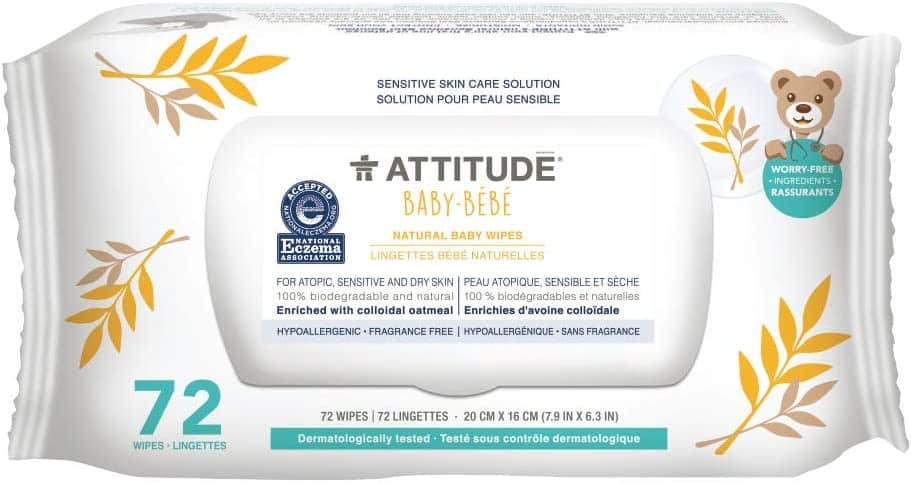
Eco by Naty Wipes
These non-toxic baby wipes are made from 100% plant based fibers and received the TÜV Austria “OK Compost” certification. Eco by Naty wipes use sodium benzoate and potassium sorbate as preservatives.
Cost per wipe: $0.06
Ingredients: Aqua/water, Gluconolacton, Aloe Barbadensis Leaf Water, Chamomila Recutita Flower Water, Citric Acid, Propanediol, Caprylyl/Capryl Glucoside, Sodium Benzoate, Calcium Gluconate, Potassium Sorbate
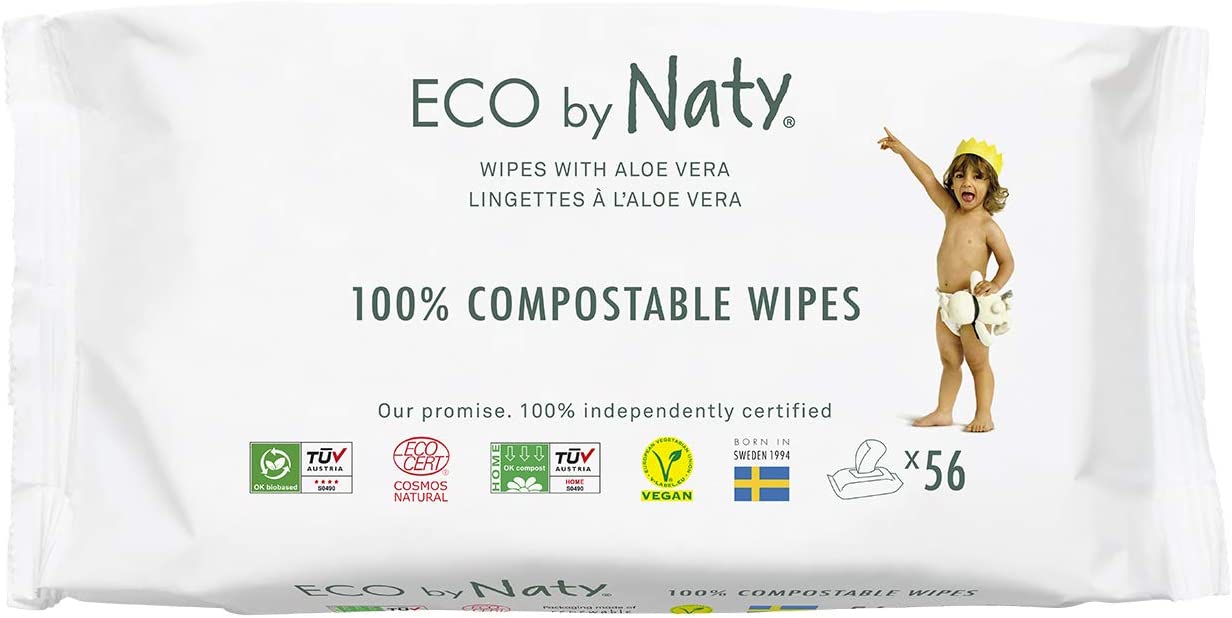
Eco Pea Baby Wipes
These non-toxic wipes are EWG-verified, made of biodegradable bamboo, and contain sodium benzoate as a preservative. The rest of Eco Pea’s ingredients are squeaky clean, but I have not yet used these wipes to evaluate how they perform.
Cost per wipe: $0.12
Ingredients: Water (aqua), Polyhexamethylene Biguanide HCL, Sodium Benzoate, Decyl Glucoside, Ethylhexylglycerin, Hydroxyacetophenone, Gluconolactone, Citric Acid, Aloe Barbadensis Leaf Extract, Chamomile Recutita Extract, Cucumis Sativus (Cucumber) Fruit Extract, Silicone Antifoam Emulsion
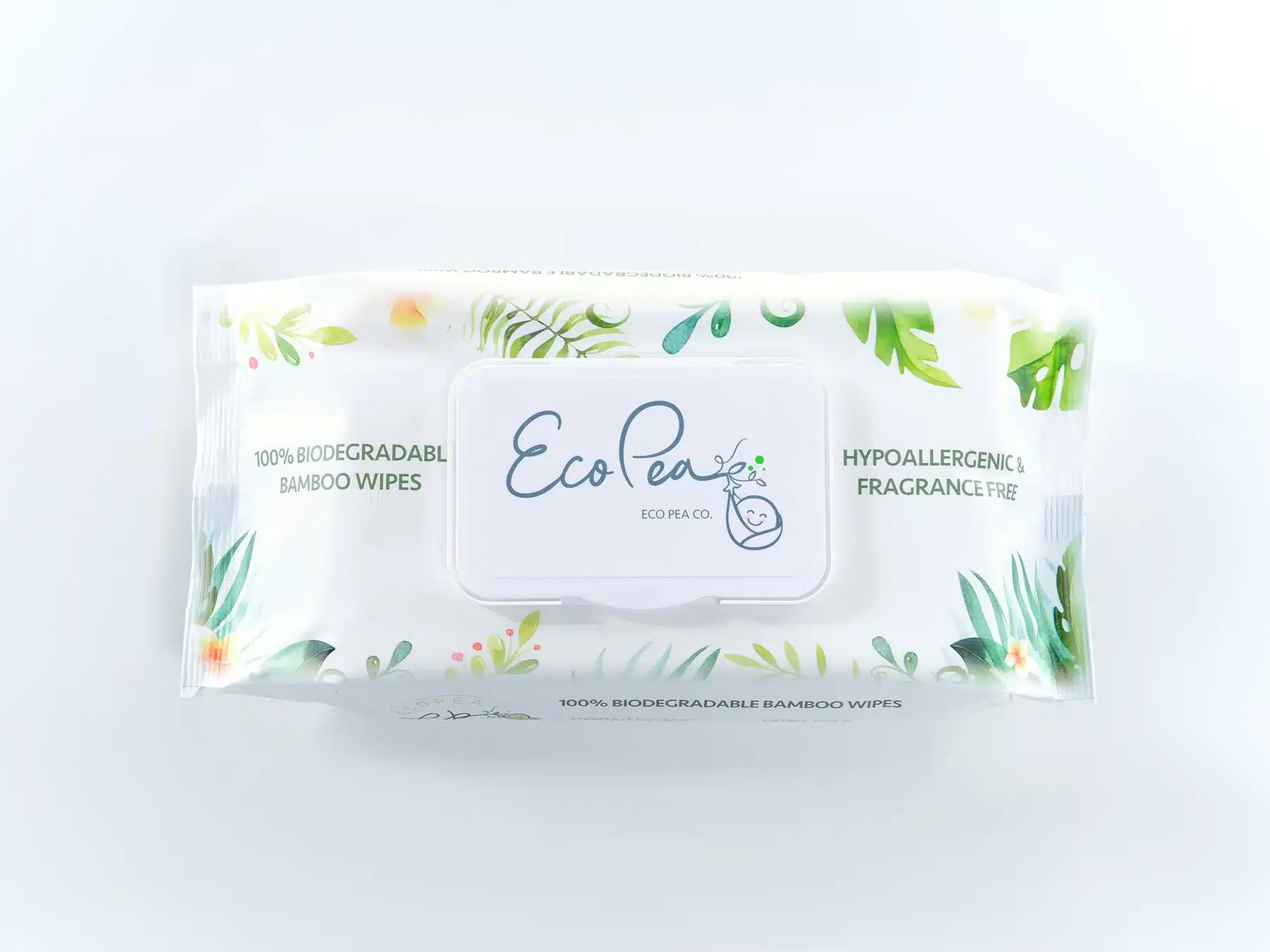
Healthybaby Wet Wipes
These EWG-verified, non-toxic baby wipes are made from wood pulp, and get extra points for having the Forest Stewardship Council (FSC) certification. This means that the wood used was responsibly sourced.
Healthybaby’s wipes contain sodium benzoate and citric acid for preservation, and all of the other ingredients are natural and safe.
In addition to the EWG verification, these baby wipes earned a Made Safe certification, and Healthybaby is a certified B Corp, as well!
From a performance standpoint, I love how these thick, embossed wipes clean up with just the right amount of moisture–they are among my favorite wet wipes.
Cost per wipe: $0.11
Use code GIMME15 for 15% off, including subscriptions.
(Healthybaby also makes an organic cotton dry wipe that you can use with just water, too.)
Ingredients: Purified Water, Aloe Barbadensis Leaf Juice†, Chamomilla Recutita (Matricaria) Extract, Lonicera Caprifolium (Honeysuckle) Flower Extract, Lonicera Japonica (Honeysuckle) Flower Extract, Glycerin (Vegetable-derived), Tocopherol (Vegetable-derived), Gluconic Acid (Plant-derived), Sodium Benzoate (Plant-derived), Citric Acid (Plant-derived) †Certified Organic Ingredient
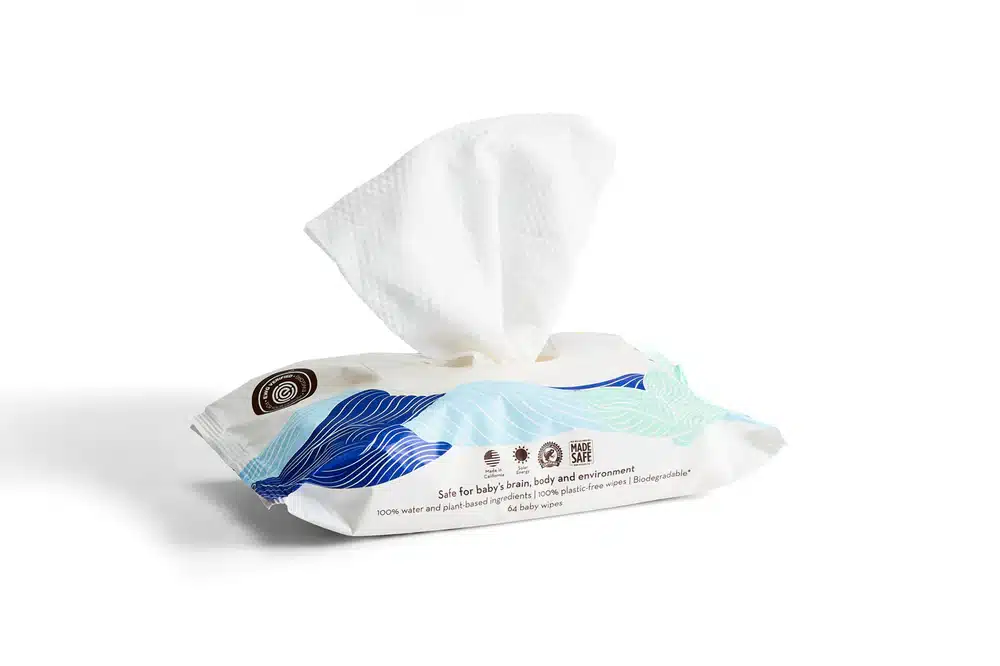
Hello Bello Wipes
The are made of plant fibers and have a very clean list of ingredients. They contain sodium benzoate as a preservative. I like that Hello Bello’s non-toxic baby wipes are produced in the USA.
Cost per wipe: $0.05
Ingredients: Water (Aqua), Gluconolactone, Sodium Benzoate, Hydroxyacetophenone, Aloe Vera Extract (Organic), Chamomile Extract (Organic), Decyl Glucoside, Polyaminopropyl Biguanide, Ethylhexylglycerin.
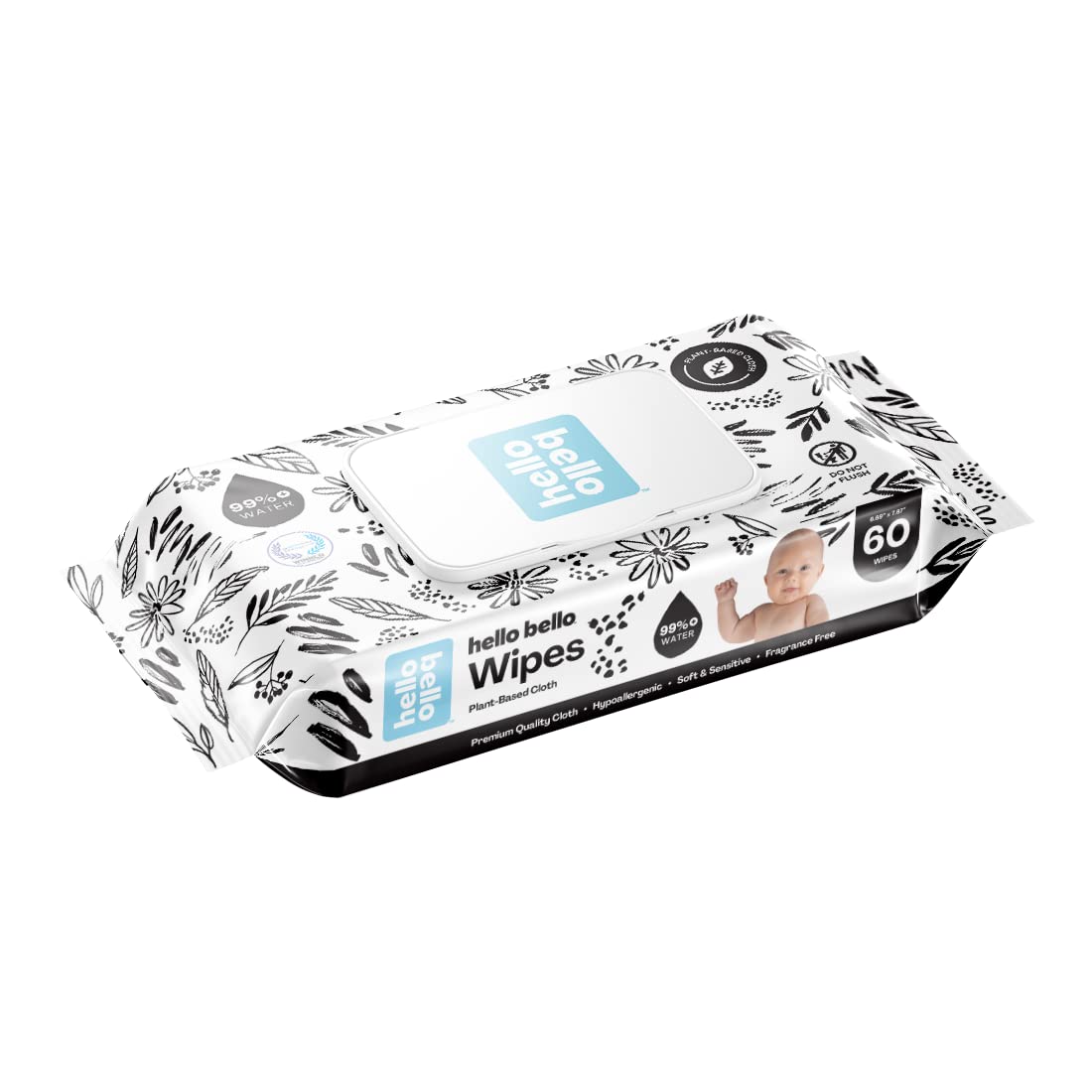
Jackson Reece Biodegradable Wipes
These wipes are made from wood pulp, and have a nice short list of ingredients. These come in scented (essential oils) or unscented varieties, and the wipes are big and thick. They offer the perfect level of wetness, and use potassium sorbate as a preservative.
Cost per wipe: $0.10
Ingredients: Aqua (purified and deionized water), Betaine (humectant derived from vegetable, to help moisturize the skin), Glycerin (vegetable based preservative carrier), Caprylyl/Capryl Glucoside (derived from vegetable, gentle cleansing agent to solubilize oils), Levulinic Acid (vegetable derived preservative), Potassium Sorbate (preservative), Sodium Levulinate (vegetable derived preservative), Chamomile Recutita Flower Extract (Chamomile derived from plant to help soothe skin), Aloe Barbadensis Leaf Juice (Aloe Vera derived from plant to moisturizer and cleanse skin), Sodium Citrate (pH adjuster derived from sugar beet).
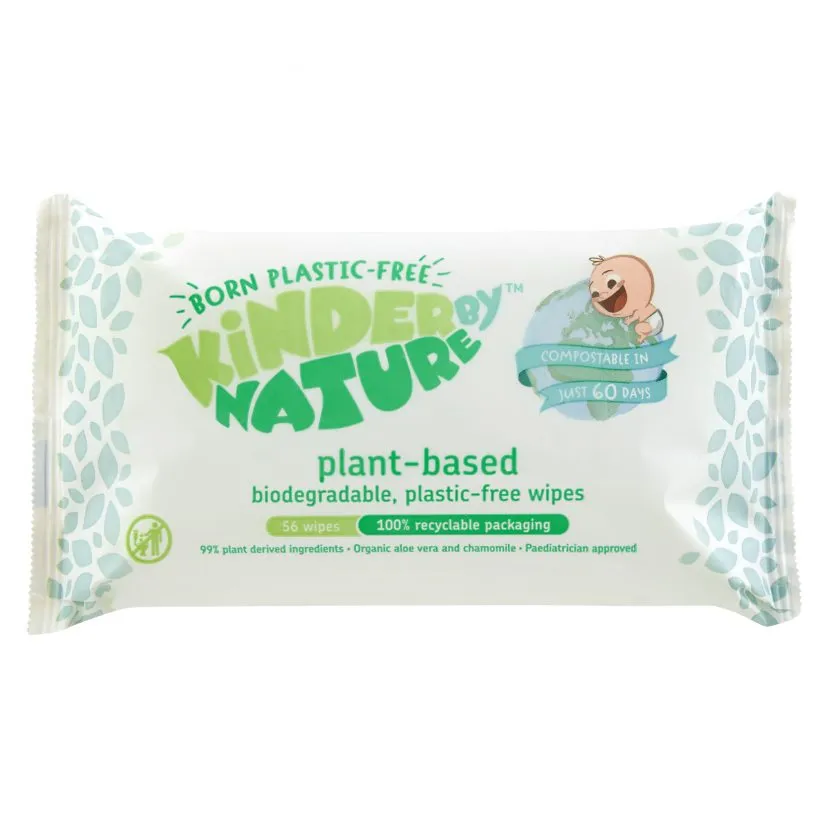
Joonya Natural Baby Wipes
I still use these wipes for cleaning hands and faces in our house. I like the amount of wetness (but lack of any soapy suds) in these wipes. Joonya uses decyl glucoside as a surfactant and silver hydrogen citrate as a preservative (which carries an EWG score of just 1). These do not contain sodium benzoate, and the wipe itself is made of 100% wood pulp, which is FSC-certified.
Cost per wipe: $0.09
Ingredients: Purified Water, Organic Aloe Barbadensis (Aloe Vera) Leaf Juice Powder, Organic Chamomilla Recutita (Matricaria) Flower Extract, Silver Dihydrogen Citrate, Citric Acid, Decyl Glucoside, Organic Simmondsia Chinensis (Jojoba) Seed Oil, Sodium Citrate.
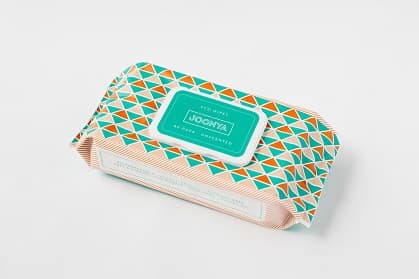
Pipette Baby Wipes
I haven’t tried Pipette’s EWG-verified wipes, so please comment below if you’ve tried them! These wipes do not contain sodium benzoate and have a very clean ingredients list. The wipe themselves are made of 100% plant-based materials. Discount code: THEGOODSTUFF
Cost per wipe: $0.07
Ingredients: Water, Glycerin, Squalane, Sorbitan Oleate Decylglucoside Crosspolymer, Sorbitan Caprylate,, Potassium Sorbate, Citric Acid
Natracare Baby Wipes
These non-toxic baby wipes are certified by EWG, and contain absolutely nothing of concern.
Natracare use organic cotton for their wipes, which are free of sodium benzoate. The only downside is that these are among the most expensive baby wipes we reviewed.
Cost per wipe: $0.10
Ingredients: Aqua, Brassica Campestris Seed Oil (Rapeseed), Glycerin, Lauryl Glucoside, Polyglyceryl-2-dipolyhydroxystearate, Prunus Armeniaca Kernel Oil (Apricot)*, Levulinic Acid, Parfum (Citrus Dulcis Extract (Orange), Amyris Balsamifera Bark Oil, Coriandrum Sativum Fruit Oil (Coriander), Juniperus Virginiana (Red Cedar), Citrus Bergamia Peel Oil Expressed (Bergamot Orange), Citrus Amara (Bitter Orange), Piper Nigrum Oil (Black Pepper)), Sodium Levulinate, Sodium Chloride, Chamomilla Recutita Flower Extract (Chamomile)*, Maltodextrin, Prunus Amygdalus Dulcis Oil (Sweet Almond)*, Tocopherol (Vitamin E), Helianthus Annuus Seed Oil (Sunflower), Potassium Sorbate, Glyceryl Oleate, Dicapryl Carbonate, Sodium Phytate, Limonene**, Linalool**
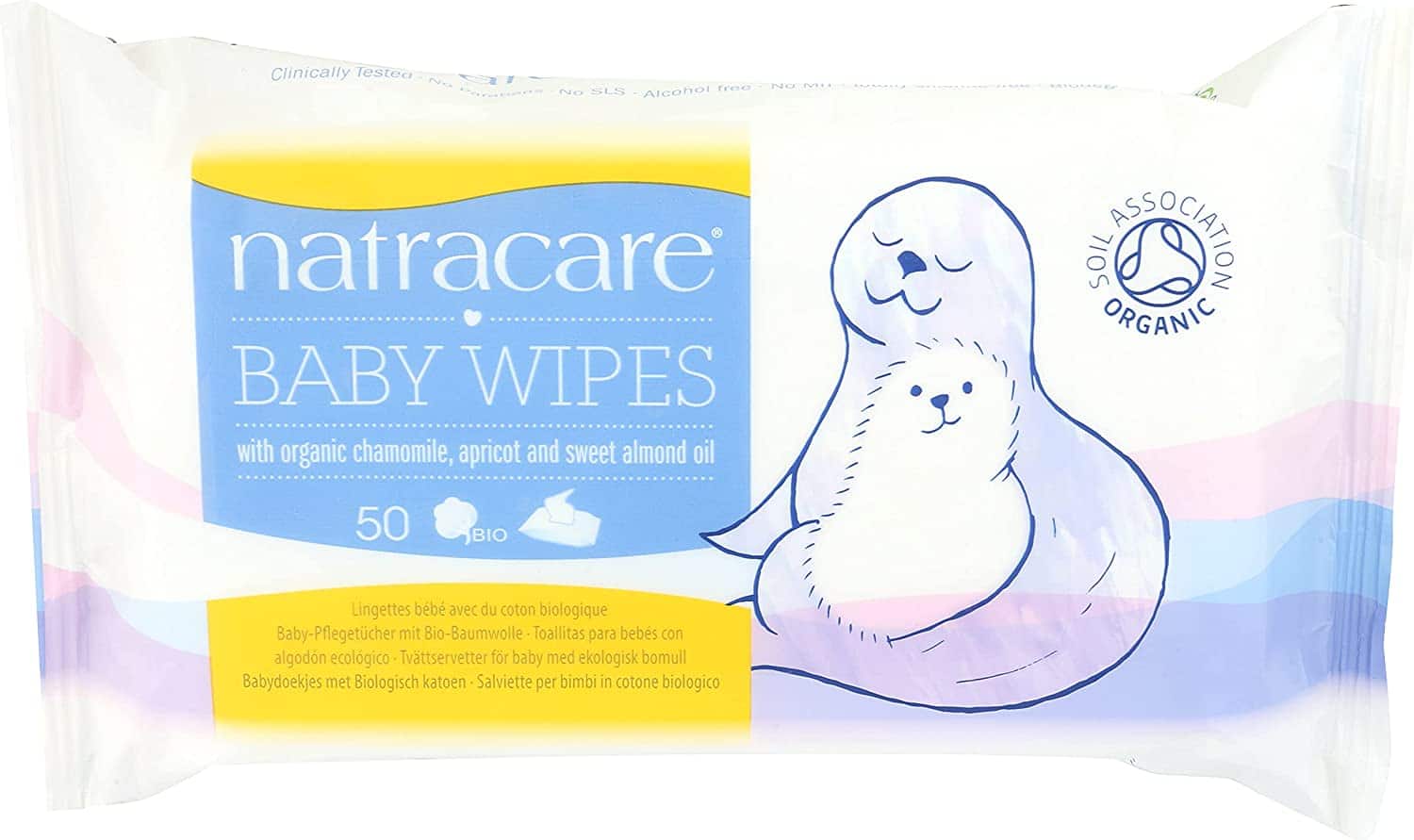
Good Stuff
Dyper Baby Wipes
Some of our favorite diapers are Dyper, and we like their wipes too! The only ingredient I don’t love is the they contain benzethonium chloride as a preservative, which is why we aren’t calling these Best Stuff. Dyper’s wipes are made of 100% bamboo viscose, the best material we found for a disposable wipe. These do not contain sodium benzoate.
Cost per wipe: $0.10
Ingredients: Water (99%), Glycerin, Chamomilla Recutita Flower Extract, Tocopheryl Acetate, Aloe Barbadensis Extract, Decyl Glucoside, Benzethonium Chloride, Citric Acid.
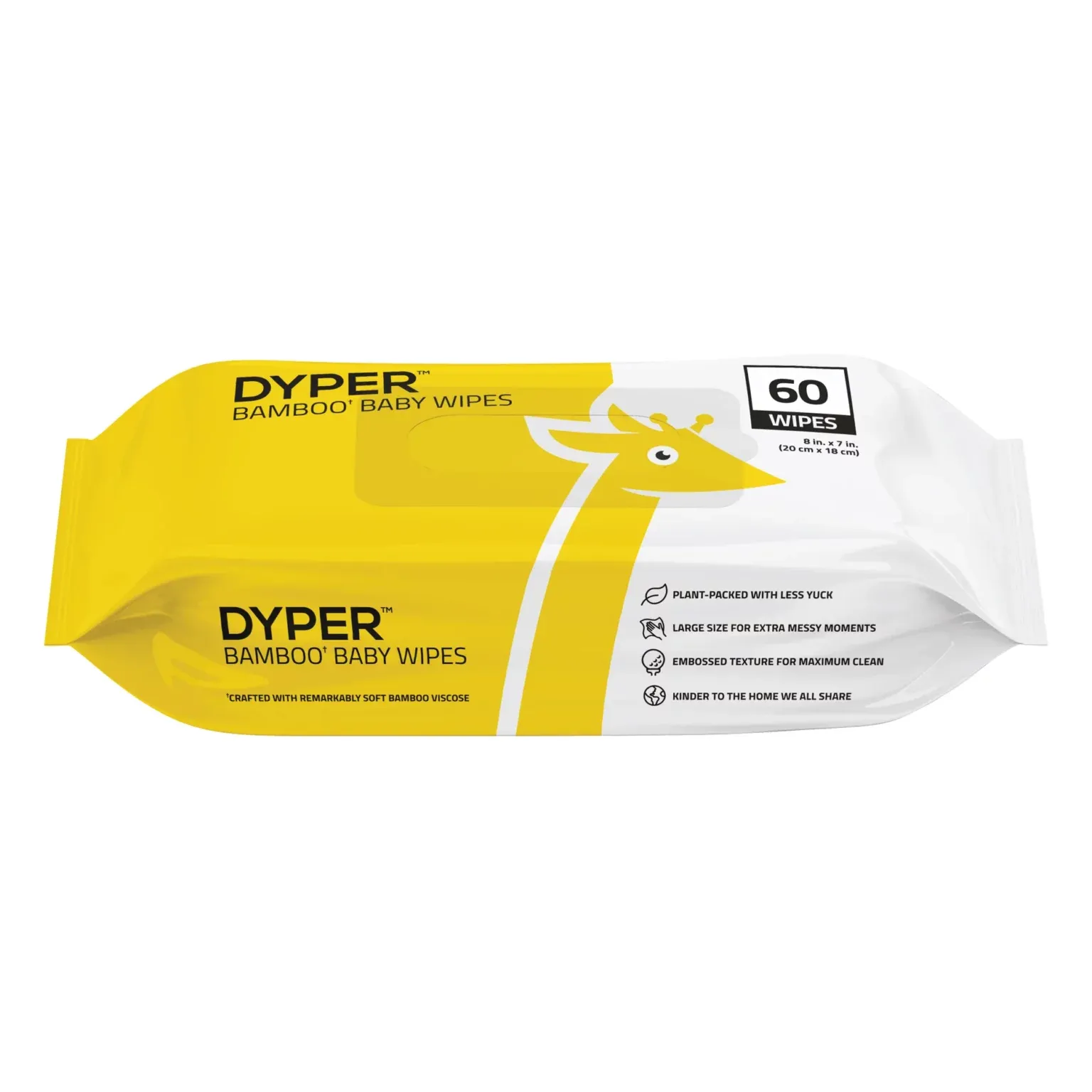
Made Of Soothing Baby Wipes
Made Of wipes are free of alcohol and other skin irritants, and are independently tested to be free of microbes, heavy metals, parabens, and more. Notably, nowhere on their site does Made Of tell you what their wipes are made of, which is why we are not calling them Best Stuff. These wipes DO contain sodium benzoate.
Cost per wipe: $0.13
Ingredients: Water, Glycerin, Aloe Barbadensis Leaf Juice, Lactobacillus/Arundinaria Gigantea Ferment Filtrate, Lavandula Angustifolia (Lavender) Oil, Argania Spinosa Kernel Oil, Sorbitan Oleate Decylglucoside Crosspolymer, Tocopherol, Gluconic Acid, Citric Acid, Sodium Benzoate, Potassium Sorbate
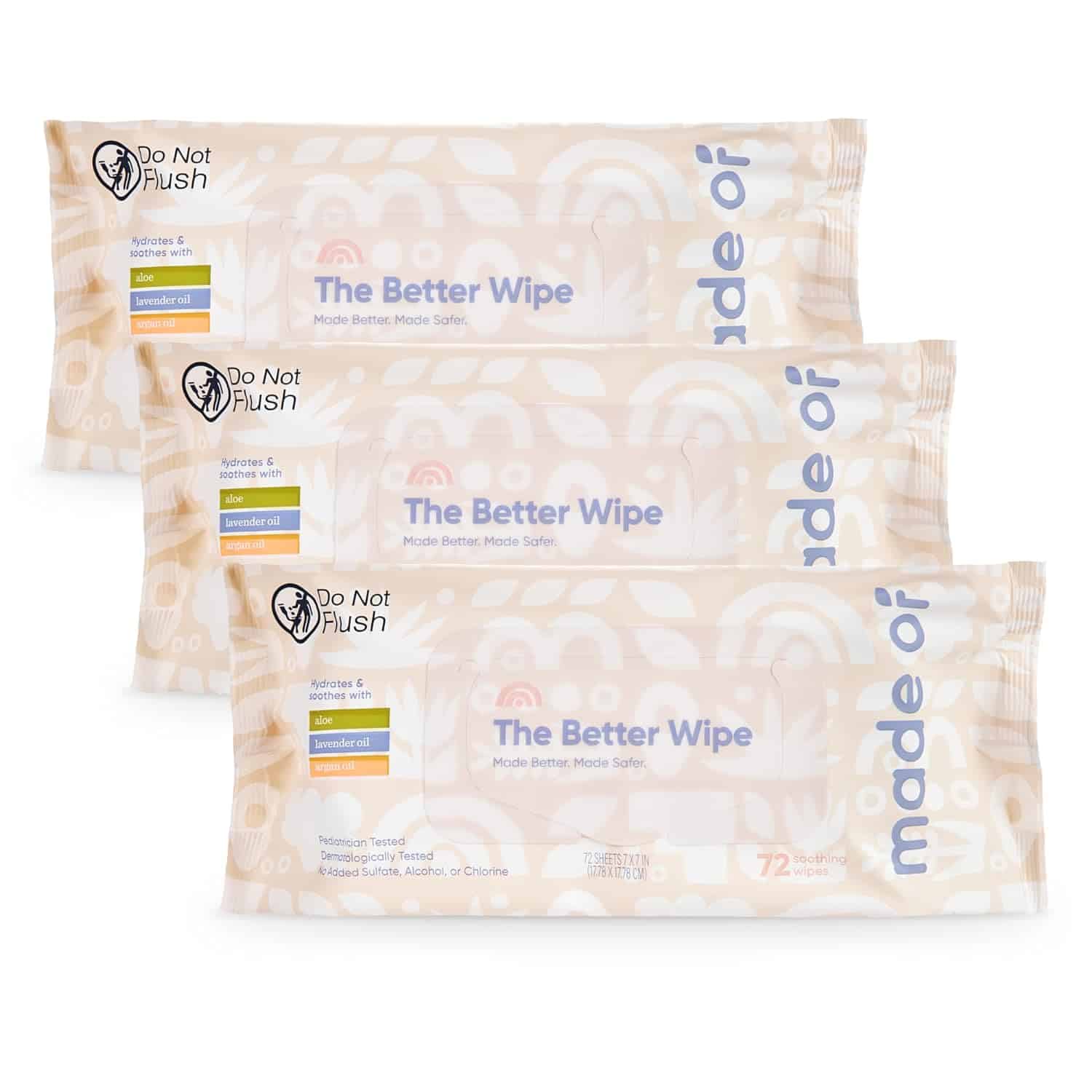
Okay Stuff
BabyGanics Face, Hand, and Baby Wipes
If you are a regular reader of mine, you know I often categorize BabyGanics as Sneaky Stuff. Their wipes, however, are actually not bad, with sodium benzoate being the only ingredient I don’t love–but not enough to concern me. However, because these wipes are made of plastic (polyester) they are detrimental to the environment–and from a company that has “ganic” in it’s name, this feels decidely Sneaky!
Cost per wipe: $0.04
Ingredients: purified water, glyceryl oleate citrate, caprylic/capric triglyceride, decyl glucoside, olea europaea (olive) oil†, persea gratissima (avocado) oil, chamomile recutita (matricaria) lower extract†, calendula oicinalis lower extract†, aloe barbadensis extract†, solanum lycopersicum (tomato) seed oil, helianthus annuus (sunlower) seed oil†, vaccinium macrocarpon (cranberry) seed oil, nigella sativa (black cumin) seed oil†, rubus idaeus (raspberry) seed oil, citric acid, sodium benzoate, potassium sorbate Soft wipe material: polyester, viscose †Certified Organic Ingredient
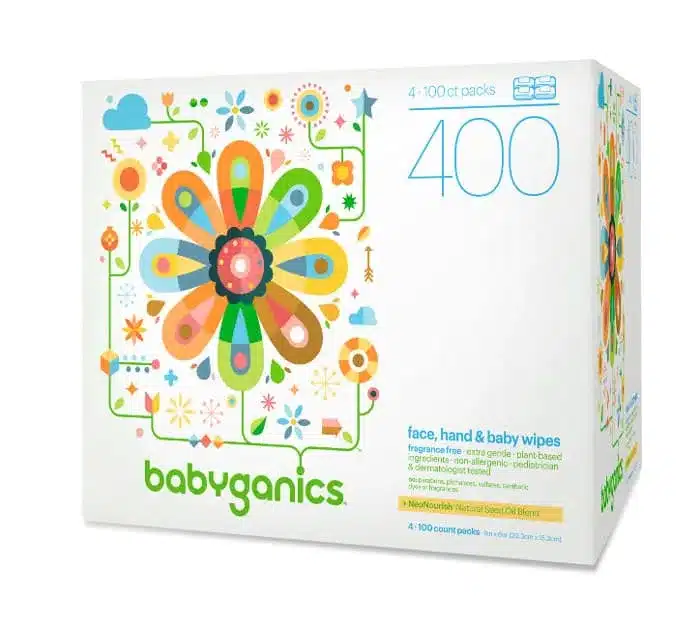
Burt’s Bees Baby Wipes
While these wipes have a pretty clean ingredients list, the inclusion of phenoxyethanol knocks them out of Good Stuff. In addition, Burt’s Bee’s wipes are made of plant-based material but are NOT biodegradable.
Cost per wipe: $0.04
Ingredients: Water, glycerin, aloe barbadensis leaf juice, helianthus annuus (sunflower) seed oil, tocopherol, citric acid, sodium benzoate, potassium sorbate, sodium cocoyl glutamate, disodium cocoyl glutamate, phenoxyethanol.
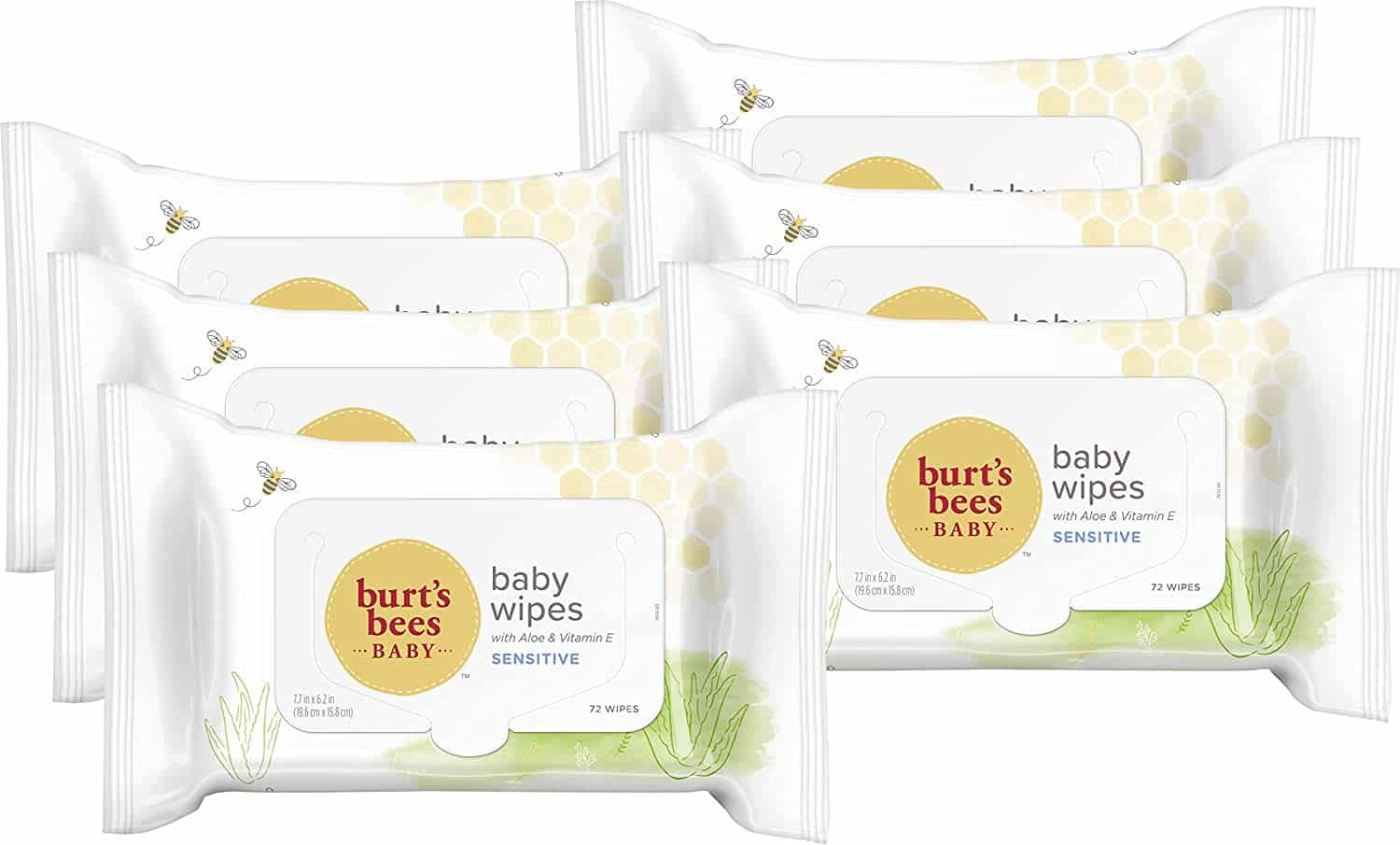
Dapple All Purpose Wipes
Contains phenoxyethanol (and sodium benzoate), which means they do not qualify as Good Stuff.
Cost per wipe: $0.17
Ingredients: Water, glycerin (emollient derived from vegetables), decyl glucoside (mild cleaner derived from sugar), malic acid (pH adjuster derived from apples), potassium sorbate, gluconolactone, and sodium benzoate (preservative).
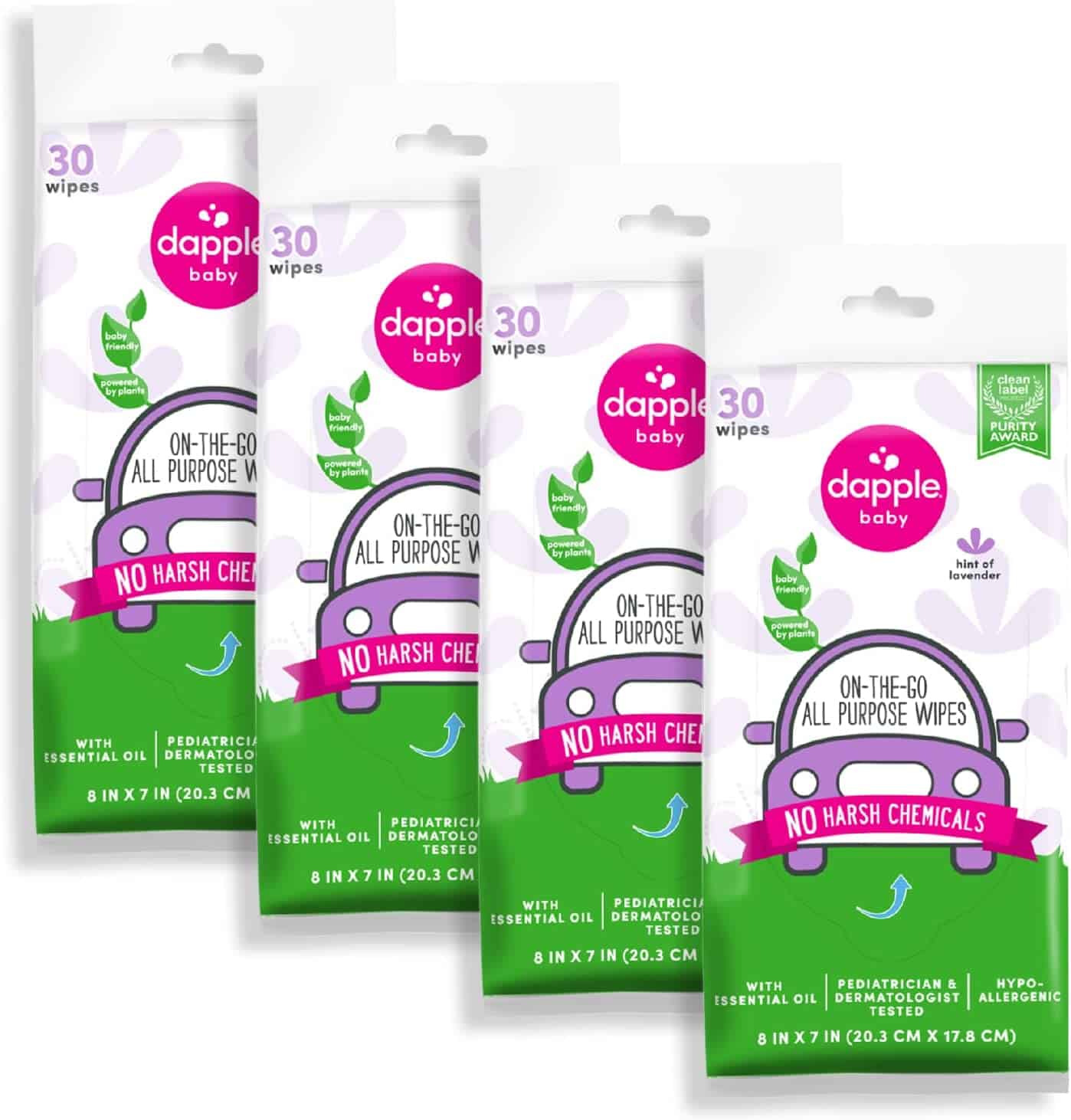
Honest Wipes
Some of Honest’s products are Good Stuff and some are not. Their wipes fall into the former category in terms of the ingredients listed on the label. Honest’s wipes are made of plant-based fibers, but without knowing which specific plants, we cannot know for sure if these are biodegradable. A 2019 study found Honest wipes to be contaminated with formaldehyde, but this may have been an isolated batch. Still, we are keeping these wipes as just Okay Stuff for now. You can get Honest on their website as well as on Amazon.
Cost per wipe: $0.07
Ingredients: Water (Aqua/Eau), Trisodium Ethylenediamine Disuccinate, Sodium Benzoate, Sorbitan Oleate Decylglucoside Crosspolymer, Caprylyl Glycol, Ethylhexylglycerin, Citric Acid
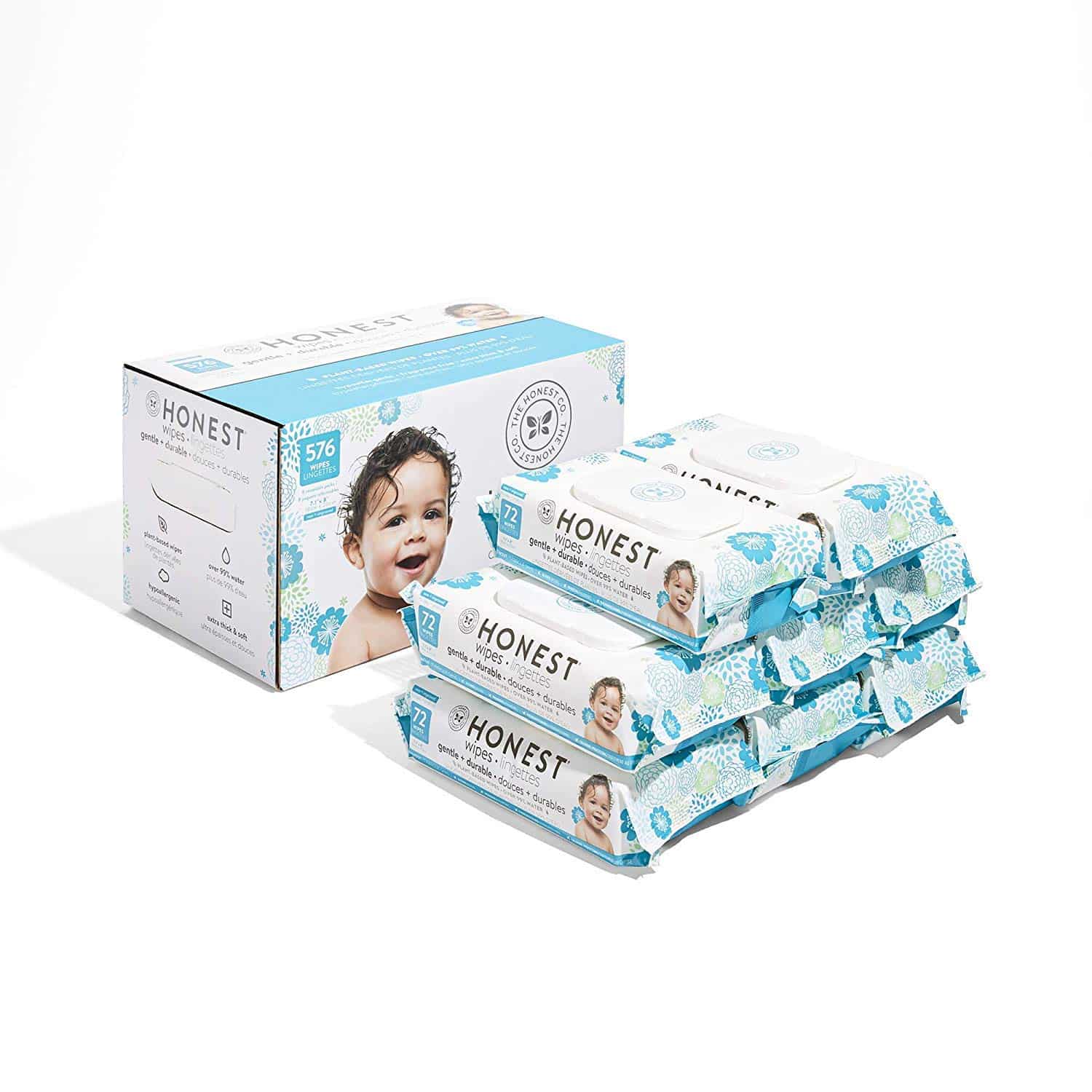
Kirkland Baby Wipes
The preservative phenoxyethanol knocks these out of the Good Stuff, but Kirkland’s wipes are better than many conventional brands–especially as they are made of wood pulp instead of plastic. These wipes do contain sodium benzoate.
Cost per wipe: $0.03
Ingredients: Purified water, Coco Glucoside, Xanthan Gum, Glyceryl Oleate, Phenoxyethanol, Sodium Benzoate,
Tetrasodium Glutamate Diacetate, Citric Acid, Sodium Citrate
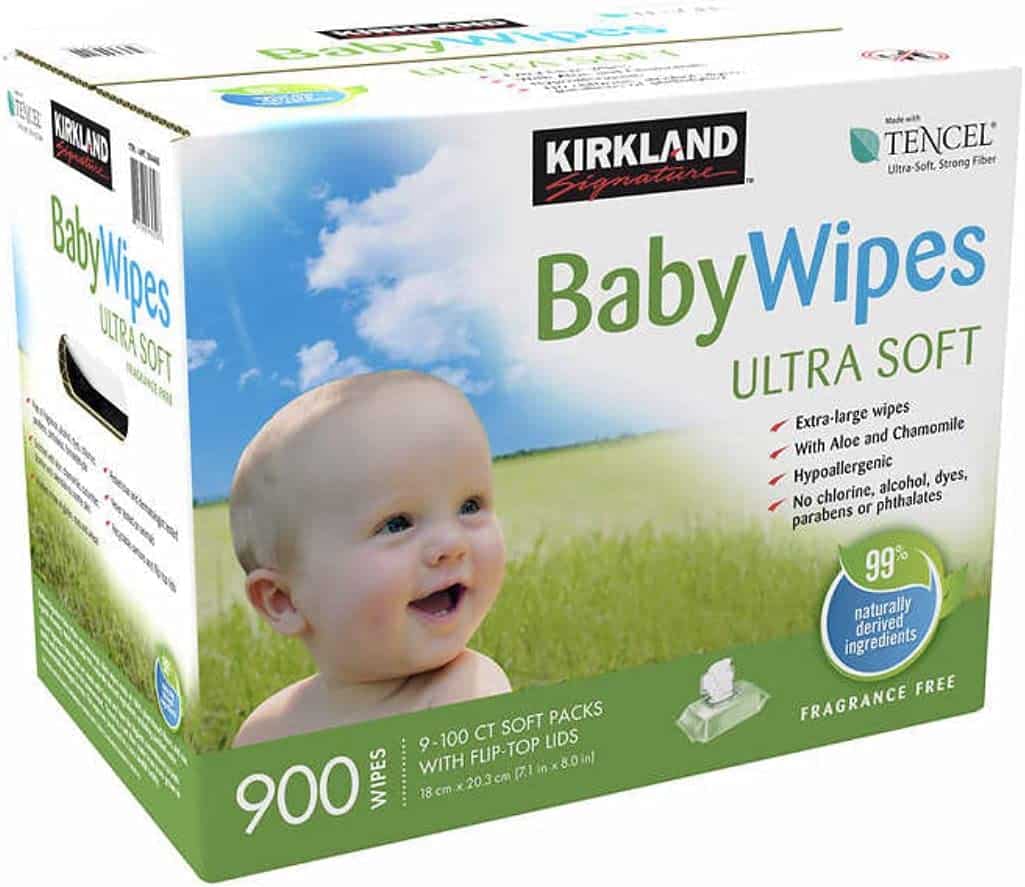
Mama Bear
Lots of you love these wipes, but they are only Okay Stuff as they contain phenoxyethanol and sodium benzoate.
Cost per wipe: $0.08
Ingredients: PURIFIED WATER, PHENOXYETHANOL, DECYL GLUCOSIDE, TETRASODIUM GLUTAMATE DIACETATE, SODIUM BENZOATE, SODIUM CITRATE, CITRIC ACID, SODIUM BICARBONATE, GLYCERIN, TOCOPHERYL ACETATE, CUCUMIS (SATIVUS) CUCUMBER FRUIT EXTRACT, CALENDULA OFFICINALIS FLOWER EXTRACT, GLYCYRRHIZA GLABRA (LICORICE) ROOT EXTRACT, CHAMOMILLA RECUTITA (MATRICARIA) FLOWER EXTRACT, ALOE BARBADENSIS LEAF EXTRACT, MICROCRYSTALLINE CELLULOSE, CELLULOSE GUM
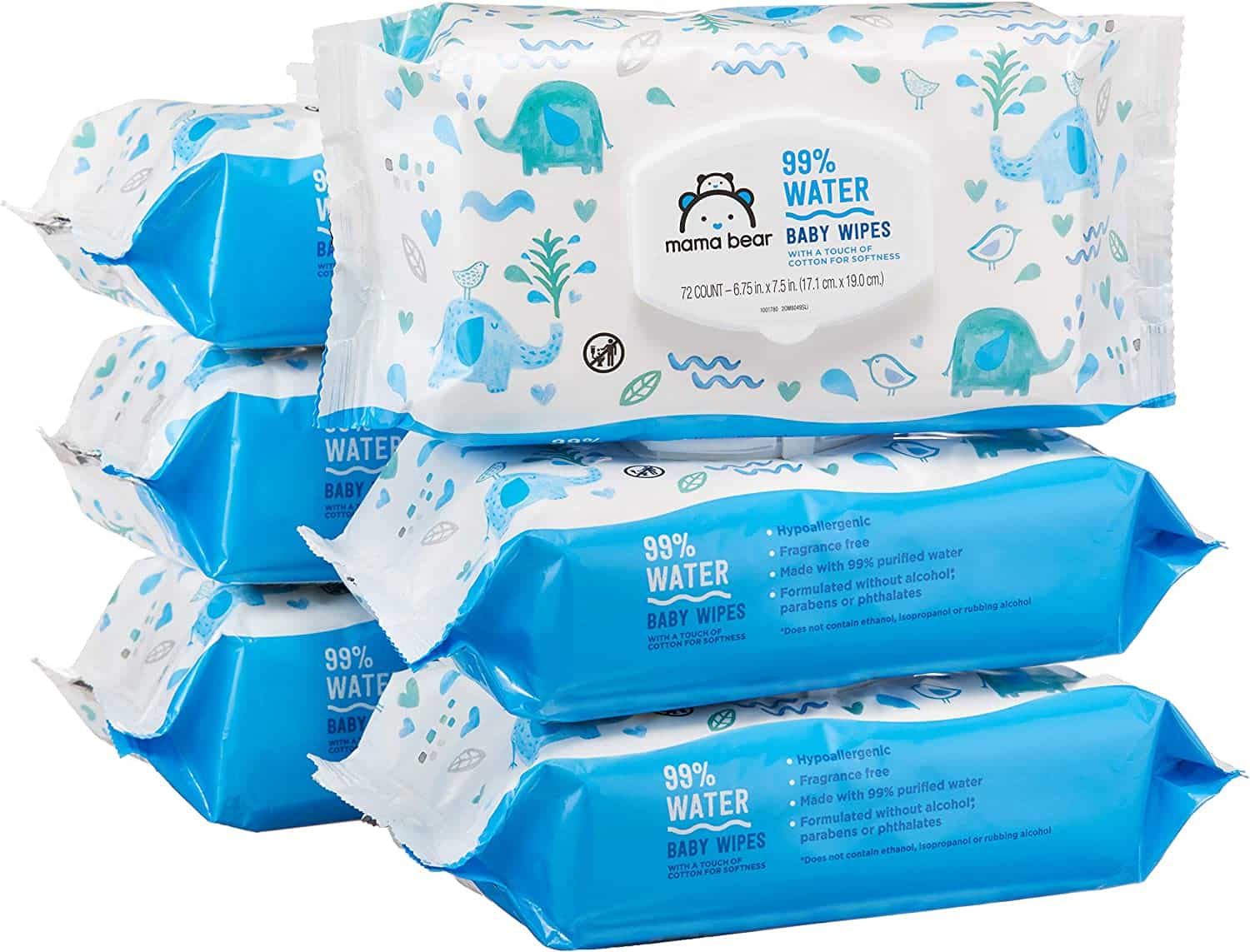
Parasol Wipes
Parasol wipes were found to contain formaldehyde in this study although of course we can’t know if any batch contains it now. While the ingredients are really clean, the wipe itself is plastic-based, and in 2022 there is no reason for this!
Cost per wipe: $0.06
Ingredients: Spunlace, RO Water, Glycerin, Potassium sorbate, aloe barbadensis leaf extract, xylitol, citric acid, alkyl polyglucoside
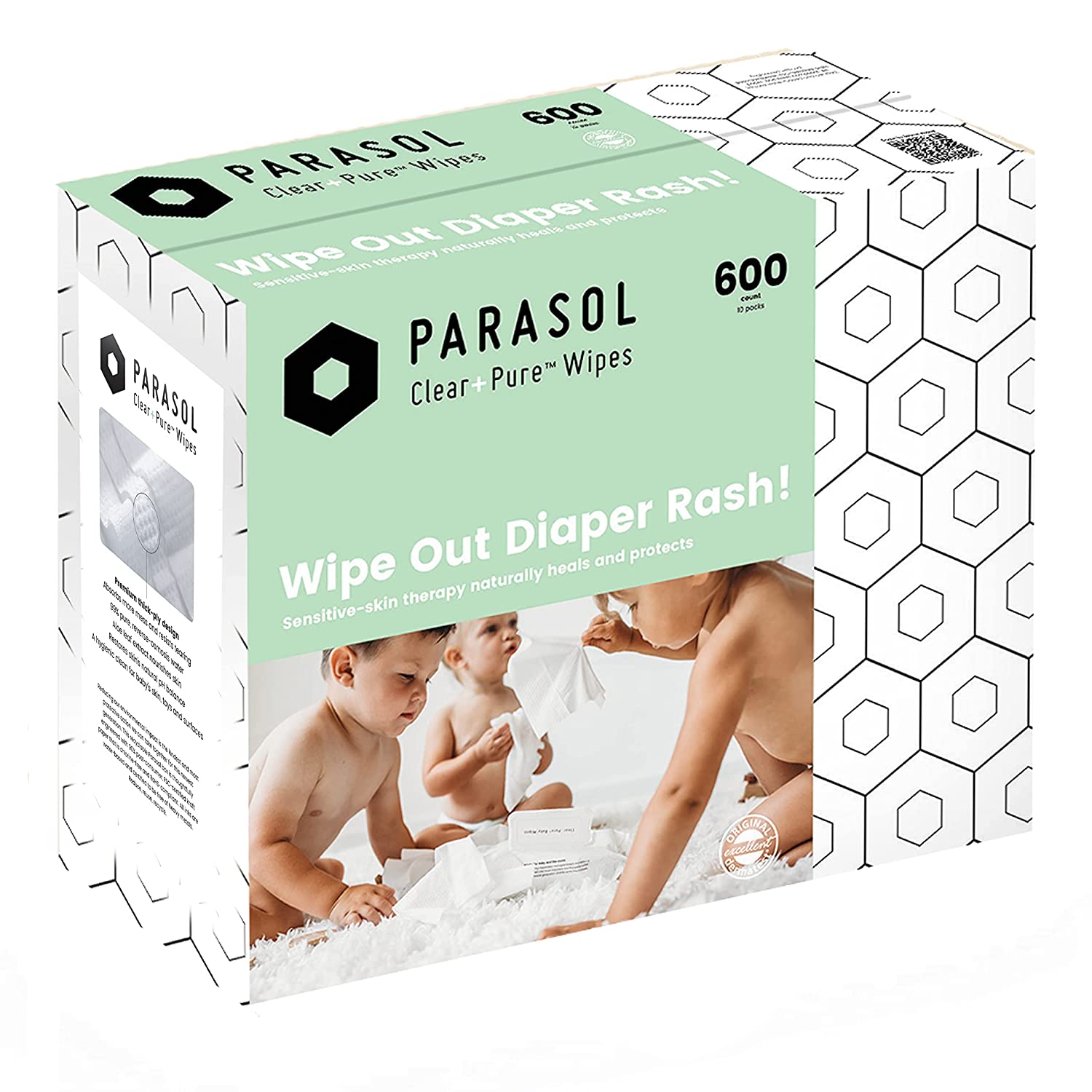
Seventh Generation Free & Clear Wipes
These can be called non-toxic baby wipes, (although they do use sodium benzoate as a preservative). The real offense is that they are made of mostly plastic, so they are not an eco-friendly choice.
Cost per wipes: $0.08
Ingredients: Water, cocoamidoproply pg-dimonium chloride phosphate, sodium benzoate, quillaja saponaria wood extract, citric acid, aloe barbadensis leaf extract, tocopheryl acetate. The wipe material used in this product is a blend of wood pulp, polypropylene and polyethylene.
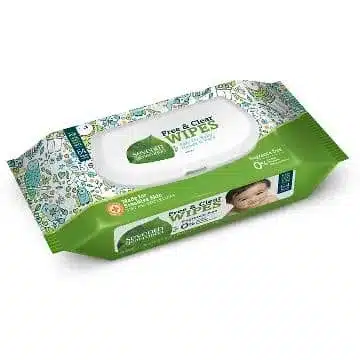
WaterWipes
These wipes are billed as being biodegradable, and indeed they will biodegrade within 12 weeks “under the right conditions,” which is of course the challenging part! We don’t have specifics on what WaterWipes are made of beyond being “bio-based.” WaterWipes contain trace amounts of highly toxic benzalkonium chloride as a preservative. The amount is small enough to still call these Okay Stuff. Note that WaterWipes were also one of the brands of wipes to be found to contain formaldehyde in that 2019 study.
Cost per wipe: $0.07
Ingredients: Water (Aqua) 99.9%, Citrus Grandis (grapefruit) seed extract**Contains trace of Benzalkonium Chloride
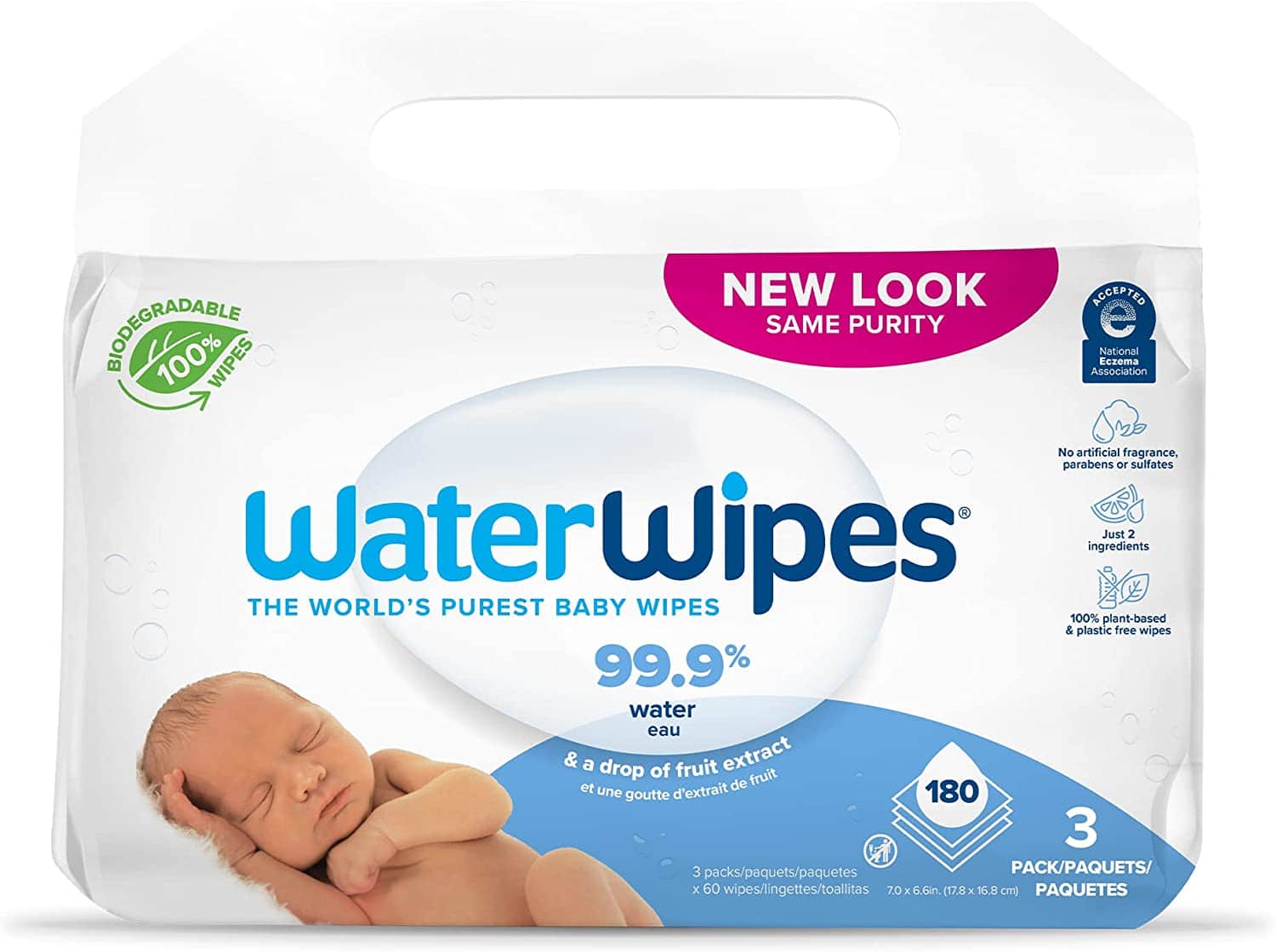
Bad Stuff
Huggies
Unsurprisingly, Huggies baby wipes are some of the worst. Even their unscented wipes contain a number of questionable ingredients–including numerous parabens and DMDM hydantoin, a known human immune system toxicant–so don’t be fooled by the natural-sounding varieties (Cucumber and Green Tea, for example). I can barely stomach the scent of these wipes.
Lanisoh Clean & Condition Baby Wipes
These would never be Good Stuff as they are made of rayon and polyester.
They also contain a bunch of problematic ingredients, including PEG chemicals, phenoxyethanol, and benzalkonium chloride.
Pampers Wipes
Pampers is another brand that just doesn’t make any safe wipes, despite their numerous varieties. While a few score only moderate hazard on Skin Deep, the majority are ranked high hazard, thanks to fragrance, PEG chemicals, and benzyl alcohol. Even their “Sensitive” label should be avoided, as they include several PEG chemicals. Oh, and the wipes themselves are made of a plastic blend.
Up & Up Baby Fresh & Clean Baby Wipes
While Target’s brand of wipes are made of plant-based fibers, they contain synthetic fragrance. Update: The fragrance-free version of these wipes are actually fine.
Sneaky Stuff
365 Wipes
While the ingredients in the Whole Foods brand of wipes don’t pose a real risk to a baby (although we don’t love benzoic acid), the wipes themselves are made of polypropylene. Any wipe that claims to be “eco” and then is made of plastic is default Sneaky Snuff in our book.
Aleva Naturals Bamboo Baby Wipes
These sound great at first glance, being made of bamboo that biodegrades within 21 days. Sadly, the ingredients in these wipes aren’t great— they contain cocamidopropyl betaine, didecyldimonium chloride, and PEG chemicals (and their “Sensitive” ones really are not any better.)
BabyGanics Face, Hand, and Baby Wipes
If you are a regular reader of mine, you know I often categorize BabyGanics as Sneaky Stuff. Their wipes, however, are actually not bad, with sodium benzoate being the only ingredient I don’t love–but not enough to concern me. However, because these wipes are made of plastic (polyester) they are detrimental to the environment–and from a company that has “ganic” in it’s name, this feels decidedly Sneaky!
Bloom Baby Unscented Wipes
These wipes aren’t affiliated with Bloom Baby, the company that makes chairs. They contain phenoxyethanol so at most they’d be considered Okay Stuff. They appear to be made of a plant based material but there is no way to contact them to confirm. Between that and seemingly having stolen the other Bloom Baby’s name, we are leaving them in Sneaky Stuff until we get a response from them!
Huggies Natural Care Baby Wipes
Fortunately, Huggies finally ditched the parabens and methylisothiazolionone (that’s thanks to you guys as consumers!).
Because these wipes still contain fragrance and PEG chemicals, they remain in the Sneaky Stuff. Additionally, they are made of mostly plastic.
Mustela Baby Cleansing Wipes
I am confused by the EWG verification of this brand. Some of the versions have full-on fragrance, but even the unscented is made of mostly polyester. Using a plastic to make a disposable wipe is just not necessary when there are so many good plant-based material options available!
Note: This article contains affiliate links or sponsored content, which means that if you make a purchase, we may earn a commission. We only recommend products that meet our strict standards for non-toxicity and that we use (or want to use!) ourselves. Thank you so much for supporting the brands that make Good Stuff!
Enjoying this guide?
Join 60K families who rely on our free guides on everything from milk to mattresses! Sign up to get $5 off your first order, access to our ultimate Clean Products Cheat Sheet, and ongoing exclusive access to coupon codes and promotions. Our weekly newsletter is filled with well researched tips and tricks to live a toxin-free lifestyle.
Related Posts
The Best Non Toxic Baby Bottles
Baby’s Only Formula Review: The Most Affordable Good Stuff
Safe, Non-Toxic Toys Guide
The Best Non-Toxic Diapers Guide (Updated 2023)
168 responses to “Best Baby Wipes Guide 2022”
-
Hi, just wondering if you would recommend kudos water wipes since the diapers are good? Or is healthy baby water wipes a better option?
-
What about Believe wipes?! I was hoping these would be included in your updated guide! Here is the Amazon link: https://www.amazon.com/Believe-Wipes-hypoallergenic-chemical-free-unscented/dp/B0939CK2Y8/ref=sr_1_3?crid=TR9U8XA5S3NR&keywords=believe+wipes&qid=1667171479&qu=eyJxc2MiOiIyLjIwIiwicXNhIjoiMS4yMyIsInFzcCI6IjAuODgifQ%3D%3D&sprefix=believe+wipes%2Caps%2C105&sr=8-3
-
Agreed. I love Coterie wipes and surprised not to see them here either. Would love to know!
-
-
What about coterie? I’ve tried pipette and they’re ok – they tear easily and aren’t as good as coterie in my opinion
-
I’m curious about Coterie as well? I’m surprised they didn’t make the list.
-
I’m also curious about Coterie
-
-
Any input on using Pipette wipes?
-
Hi there,
Presently, I use Young Living seedlings wipes but think it is time to change. Are these safe?What are your thoughts about attitude natural baby wipes or attitude little one (eco) baby wipes?
-
Here are the wipes we like… https://gimmethegoodstuff.org/?s=Wipes
-
-
Thank you for such an excellent and detailed review. Useful information for new moms.
-
Honest wipes have changed ingredients. Are they still considered good stuff??
-
So…are all these flushable?
-
Hi- It’s almost too late to ask this question as my twins are almost out of the wipe stage… but what about Water Wipes? We love them and have used them since day 1 with zero issues, zero diaper rash, zero irritation.
Thanks!
Daniela-
Oops. I should have read the other comments before I asked my question. Pls disregard.
-
-
Hi there! I am a bit confused by your recommendation of babo botanicals wipes as they contain phenoxyethanol. I know you stated previously that its a no no in baby products so inwas curious what makes these wipes different? I really wanted to purchase these but I was thrown off by this. I would greatly appreciate your input. Thank you in advance!
-
I would also like to know about Dyper wipes. I am happy with their diapers.
-
Hello! Any info on Dyper wipes? The diapers are included as “best stuff” on your disposable diaper guide. I am guessing the wipes are also great! But I love checking in here, too.
-
How about Pipette baby wipes? They say they are clean and plant-based. Would love your opinion of them. Thank you!
-
We use pipette wipes when we are out and about and they work fine but have a scent (I know there is no fragrance) that’s not pleasant to me. It fades quickly though.
-
-
Does anyone know when this list was last updated? Seems like 2018? I read info on another site where someone dilligently pursued answers from Water Wipes and they now include, with an asterisk, that their wipes include traces of Benzalkonium Chloride and they always have.
-
Benalkonium chloride has apparently been added to Waterwipes ? have you heard anything?
-
yes we’ve moved them to Sneaky Stuff, unfortunately.
-
-
Hi! What do you think
About Baby Wipes by bloom BABY, Unscented | For Sensitive Skin baby wipes? -
How about Pampers Pure wipes? And this new brand that’s popular called Hello Bello, I use their wipes and diapers and really do love them. I hope there as clean as they say!!?
-
This artical is pretty out dated. There are so many new things.
-
Yeah, I agree. It would be nice to have an updated list. Info on pampers pure, hello bello, etc.
-
Yes! I’d like to know more about pampers pure. They get a 1 on ewg but I know that’s not the ultimate resource
-
Yes, I’d like to know about Hello Bello. Anyone have any info on it?
-
-
-
-
This last April 2019, Honest Baby Wipes changed their ingredients. The wipes now contain chemicals and preservatives including sodium benzoate.
-
I just saw that on my wipes. If you were using them did you switch? If so to what? More research ☹️
-
-
Hi Maia, the Honest Co. changed the formula of the wipes. Are they still considered Good Stuff?-Thanks in advance for your reply!!!
-
Love your product guides! I’m interested in trying the new Hello Bello wipes. Would love if you could add those to your review!
-
I’m curious about the brandless wipes noted above. Also the Target Cloud Island brand came out with wipes. The only ingredient I would think is concerting is the Sodium Benzoate which you mentioned above.
Water (wets cloth & carries ingredients), Sodium Benzoate (maintains product freshness), Glycerin (moisturizes skin), Coconut/Cocos Nucifera Oil (moisturizes skin), Sobitan Caprylate (blends oils & water together), Caprylyl/Capryl Glucoside (cleanses skin – removes oils & oily dirt), Sodium Citrate (minimizes ingredient odors), Xanthan Gum (maintains uniformity of formula), Tetrasodium Glutamate Diacetate (boosts freshness), Citric Acid (balances pH)
-
What do you think of these ingredients in the Brandless wipes?
Ingredients: AQUA (WATER), ALOE BARBADENSIS (ALOE VERA) LEAF EXTRACT, SODIUM COCOYL HYDROLYZED SOY PROTEIN, ORYZA SATIVA (RICE) EXTRACT, GLYCERIN, TOCOPHEROL, DEHYDROACETIC ACID, BENZOIC ACID, BENZYL ALCOHOL,
CITRIC ACID, SODIUM HYDROXIDE, POTASSIUM SORBATE -
I refer to this page from time to time as it is a good starting point for little known brands that are organic and chemical free. It would be great to have an updated guide on wipes, though. The Bum Boosa brand, for example, now contains polysorbate-20 (under ingredients wipes might contain but aren’t usually listed), potasium sorbate, a known skin and organ toxicant *(No. 3 rating on EWG), citric acid AND sodium benzoate. It is not good stuff! Meanwhile, the Honest brand wipes are better, ingredient wise, with only one ingredient a EWG 2 (which is citric acid).
-
This is a must read to parents to raise awareness on the way they consume or use wipes on a daily basis.
-
Have you reviewed ingredients in the new pampers pure wipes? Please lets know. Thank you! 🙂
-
Hi Vanessa,
Thanks for the question.
Here are the ingredients for the Pampers Aqua Pure Baby Wipes, and the EWG hazard rating for each (ranging from 1-10 with 10 being highest hazard): Water (1), citric acid (2), PEG-40 hydrogenated castor oil (3), sodium citrate (1), sorbitan caprylate (1), sodium benzoate (3), and disodium EDTA.Generally speaking we don’t like any EWG rating above a 2. Pampers Pure Wipes have 2 ingredients with a 3 rating. While these are not horrible there are other much better options out there.
https://gimmethegoodstuff.org/store/cleanwell-botanical-disinfectant-wipes-subscribe-save/https://gimmethegoodstuff.org/store/babo-botanicals-3-in-1-sensitive-baby-wipes/
https://gimmethegoodstuff.org/store/waterwipes/
https://gimmethegoodstuff.org/store/joonya-eco-wipes/
…and our favorite… https://gimmethegoodstuff.org/jackson-reece-wipes-subscription/
-
-
Could you review these: ?
Ingredients:* Water, Cocamidopropyl Pg-Dimonium Chloride Phosphate (Gently Cleanses), Glycerin, Chamomilla Recutita (Matricaria) Flower Extract, Aloe Barbadensis Leaf Extract, Tocopheryl Acetate (Soften and Soothe), Phenoxyethanol, Iodopropynyl Butylcarbamate, Citric Acid (Keeps Products Fresh and Pure). *Ingredients Greater Than 1% Listed In Descending Order.Thank you
-
Hello!
Would you mind looking at Natracare organic baby wipes and giving your opinion? I’d like something as organic, pure, and natural as possible, but that is very difficult to find. I looked up each ingredient on EWG and the ones that were concerning to me were Glycerin (rated 2), and Potassium Sorbate (rated 3). It’d be nice to find something with ingredients that were all rated 1, but I’m having a hard time with that. Here is the website with the full list of ingredients for these wipes: https://www.luckyvitamin.com/p-24079-natracare-organic-baby-wipes-50-wipe-s?LanguageCode=EN&locale=en-US&utm_source=google&utm_medium=PLA&scid=scplp73857&sc_intid=73857&utmp_campaign=SC_Shopping_Campaign_CS21_Brand&branded=yes&gclid=Cj0KCQiA5t7UBRDaARIsAOreQthlQx5nkUP9AkgF5HE2s0s_IR3F4CaBrWDCzl1tnIEJ6LCcteufDmYaAk1XEALw_wcB
Thank you so much!
-
I just recently noticed that tomorrow, March 1, 2018, a new Pampers like “Pure” are being released. Wipes and diapers and their wipes are toting 99% water with few chemicals. Curious your thoughts.
https://www.pampers.com/diaper-wipes-pure/pampers-aqua-pure-wipes#bin-section
-
Yes would love to know more about this as they have their version of a water wipe.
-
-
Our daycare uses “community wipes” and, while they’ll let you bring “sensitive” wipes, we still have to share. I was told one of the other babies uses Water Wipes and another uses Target Up and Up Sensitive wipes. I’m guessing the latter is no good? Many thanks.
-
Hi! Thank you sooo much for your time spent researching so many baby products, it’s a huge blessing to me and so many mamas!! I was curious about the Amazon elements baby unscented wipes as well, they seem to contain sodium benzoate and vitamin e which you said when combined was toxic, but in an above comment you said they actually looked good, just was curious if there good or bad.
Also, I just read on EWG that aloe Vera can be toxic if it is non decolorized. How can you tell if a product that lists aloe Vera as an ingredient is safe?
Thanks so much!!! -
Can you please advise about Naty by Nature Babycare Eco Baby Flushable Wipes? I do not see them on any of the lists and wondering if they would be more pure than Jackson Reece. My baby has terrible diaper rash so trying to order some new wipes as soon as possible. Thank you!!
-
I was wondering about these. Need flushable wipes for potty training.
-
-
I can’t find anything on Jackson Reece being made from wood pulp?
Also another person commented that Vitamin E and sodium benzoate together is cancerous. I can’t find anything from a respectable source to back that up. I know vitamin C and Sodium benzoate together is cancerous. -
Have you tried bets/ emy wipes before? What are your thoughts on those compared to others you have reviewed?
-
Hi Maia,
I was wondering what you think of Amazon Elements Baby Wipes? Good stuff? Bad stuff? And why. Here is the link to the product so you could check the ingredients, etc… https://www.amazon.com/Amazon-Elements-Wipes-Unscented-Resealable/dp/B00M4M2ZSC
I appreciate your reply. Thanks in advance.
~ Yelena-
These actually look pretty good!
-
Yay! Thank you!
-
-
-
Hi there!
I had left a comment before about the latest seventh generation formulation and it didnt seem to post…? Do you consider these good stuff? I currently use jackson reece which are great but seventh seems a lot cheaper….please advise if you think I could switch…
Also, do you have a recommendation for flushable wipes for potty training?!
Thanks so much and keep up the good work!
-
Hi I always read your blogs, it helps me choose the best stuff for my child but on this occasion I’m really upset. I seen on here you have bum boosa under “good stuff” so I bought them to try them cause I’ve heard good things about them. When I received the wipes in the mail I was excited because frankly I was sick of always making my own wipes which I was doing for a while. You’re sight has never let me down before so when I got the wipes I immediately started using them without reading the ingredients. Well I used about 4 packs of them out of the big pack I got and got curious one day and decided to go ahead and look at the ingredients and I seen that there was sodium benzoate and citric acid in them. Which to me was a shock because I do a little research myself and read that sodium benzoate by itself isn’t the worst thing ever but combined with citric acid or Ascorbic acid it creates benzene which if used enough could be a cancer causing ingredient. Now I could be wrong about some of the details if my memory is serving me right. But to me i just didn’t risk it and bought the Jackson Reece wipes and checked ingredients before buying. I’m just upset and feel a little betrayed, that is if I’m right.
-
What are your thoughts on Little Journey Wipes? Seems to be an Aldi product, but they are also sold on Amazon.
-
What are your thoughts on Little Journey
Wipes? Seems to be an Aldo product, but they are also sold on Amazon. -
Hi!
Looking at the ingredients list for Bum Boosa, it seems as though there is sodium benzoate – is this a new addition to their ingredients? Or is it in a low enough concentration to say that these wipes are in the “Best” category?
-
New ingredient, but not one I would worry about–but thanks for letting me know!
-
-
Any reviews on water wipes?
-
Yes, they are Good Stuff.:)
-
Do you prefer Waterwipes or the Jackson Reece? And why?
Thank you!
-
-
-
I love Water Wipes for my sensitive baby. It’s recently come to my attention that because the wipes have no preservatives that bacteria can grow if you take it out of the package. The package is notoriously difficult to open with one hand and I recently bought the OXO Tot PerfectPull Wipes Dispenser with Weighted Plate, which is not a warmer. It seals well and the wipes don’t appear any different. What are your thoughts?
https://www.amazon.com/dp/B0067GKHQS/ref=cm_sw_r_cp_api_RJsEzbCFD25VH
I also considered purchasing this to avoid bacteria:
Thank you!
-
Hello! I use water wipes for diaper changes but as far as wiping my kids faces/hands to sanitize what would you recommend? Thanks!
-
This is what I use!
https://gimmethegoodstuff.org/store/cleanwell-natural-hand-sanitizing-wipes/
-
-
It looks like Honest has changed the packaging design and ingredients for wipes since the recall earlier this year. The addition of Sodium Carbonate (EWG 1) is the only difference from what I can see. Would you still consider these wipes as “Good Stuff”?
-
I’m also curious about Honest Wipes after their change. Any other suggestions for wipes with the same texture? All the others that I’ve tried seem thin compared to Honest.
-
-
Hi, what are ypur thiughts on water wipes? We have just switched tothese despite the hubby noth being thrilled of the price.
-
I just wanted to comment that no wipes are really flushable. The atlantic had an article in 2016 about the toll that these so-called flushable “eco-friendly” wipes were having on our sewage systems. They should be composted or thrown in the trash.
https://www.theatlantic.com/science/archive/2016/10/are-wet-wipes-wrecking-the-worlds-sewers/504098/ -
there is so many natural baby products, I read earth mamma ranks number one!, but is it really? what is the safest baby products.
-
You mean Earth Mama Angel Baby? If so, yes that’s Good Stuff:).
-
-
Just discovered your site today and love it!! Was wondering about Natracare babywipes. Any thoughts on the ‘parfum’ with ingredients listed?
https://m.luckyvitamin.com/p-24079-natracare-organic-baby-wipes-50-wipe-s?loc=US&site=google_base&utm_source=google&utm_medium=PLA&scid=scplp73857&sc_intid=73857&utm_campaign=SC_Shopping_Campaign_Mobile_Mid_Margin&gclid=CjwKCAjw7dfKBRAdEiwAch0egXYhzudiygM0OXOPLZwFjORpCFa1xHXMOLqqM–FOsfpfGCRbWXP4BoCU04QAvD_BwE&gclsrc=aw.ds
Found them when looking for wipes not made in China (they are made in Greece) after the Honest Co recall, but will definitely check out the Jackson Reese ones.-
That “parfum” actually only contains natural essential oils. The rest of the ingredients are decent:).
-
-
Can you review Water wipes? they are available on amazon
-
Have you considered Amazon wipes? They are very popular, but I am concerned there are hidden ingredients that be harmful. I’ve been very happy with WaterWipes, but would love a cheaper alternative. Thanks!
-
are any of the pampers of buggies sensitive wipes safe?
-
What do you think about the ingredients of the bambo nature wipes?
Thank you
-
Hello there ! I’ve been using honest wipes for my one year old and I just heard that there was a recall on honest wipes and looks like they pulled back all their wipes from the shelves in every store! Apparently they found mold in the wipes ! However I never noticed or smelled and saw anything weird in the wipes ! Should I stop using the ones that I already have?!
-
Hello,
I need some help trying to find a new brand of wipes. Up until recently I was using honest wipes, but due to their recall, it’s not an option. I was wondering if you know anything about seventh generation wipes. They’re affordable (I’m a single mom with 2 toddlers) and say that they’re made for sensitive skin. Also they’re fragrance free, with no alcohol, parabens or phenoxyethanol. My girls have super sensitive skin.
I would love your feedback when you get a chance. Thank you! -
Hi Maia,
I wanted to know what your opinion was of bumboosa being made from bamboo from China?
Also, what your thoughts are about seventh generation’s actual wipe cloth being made of wood pulp, polyethylene, and polypropelene ?
Lastly, the honest company’s wipes are “responsibly made in China.” Have you heard of this phrase?
I would love your feedback on these questions. I greatly trust your judgement, appreciate your blog and refer to it frequently as a new Mom suffering with nuerocism.
-
Hi there! Just wanted to let you know you are amazing! Your blog has helped me so much, I appreciate it!
I’m sorry in advance if you’ve already answered this question. Which wipes would you use yourself on your baby if it were up to these? Honest, water wipes, 7th gen., or pampers natural unscented?
Thank you!
-
Thanks for your kind words. I’d go Water wipes out of those:).
-
-
what about pc green moist and gentle flushable wipes?. I grabbed a couple of the 7th generation ones on sale. My mom’s using baby wipes for her own bum. The package says alcohol free, fragrance free and paraben free and hypoallergenic. Mind researching that one?
-
Any thoughts on Field Day wipes?
-
This was so helpful! Thanks so much for taking the time to write this!!!
-
What about Boo Bamboo Baby wipes?
Water/Aqua/Eau, Tocopheryl Acetate, Vegetable Glycerin, Bamboo (Bambusa Arundinacea) Extract, Lavandula Angustifolia (Lavender) Oil, Citrus Sinensis (Sweet Orange) Oil, Aloe Barbadensis Leaf Juice, Natural Fragrance, Potassium Sorbate, Sodium Benzoate, Polysorbate 20, Citric Acid.
or Aleva Naturals?
Aqua (Water), Aloe barbadensis* (Aloe Vera), Cocoamidopropyl Betaine, Potassium Sorbate, Glycerin, Lavender Oil, Lauralkonium Chloride, Didecyldimonium Chloride, Citric Acid, Tea Tree Oil, Citrus Medica limonum Oil (Lemon Oil), Chamomilla recutita Extract*, Green Tea Extract, PEG 40 Hydrogenated Castor Oil.-
Boo Bamboo looks Okay. There are a few things I don’t like in Aleva–The PEG chemical and the cocoamidopropyl betaine in particular
-
-
Hi, I am new to all of this but I was just diagnosed with cancer and I need to find safe wipes to use on my daughter that won’t affect my body.
Thank you
-
Hi Darlene! I’m so sorry to hear that and hope you stay in good health. Unfortunately, since I’m not a medical professional, I strongly recommend you consult with your doctor to make sure none of these options are harmful to you.
-
-
Hello, im curious which wipe would you suggest, 7th generation or babyganics?? Since you mentioned good news about the 7th generation last June.
-
I would go with 7th Generation over BabyGanics if it were my baby.
-
-
Hey Maia!
I was just wondering whether you know if Boogie Wipes are good or not – I am assuming not. Unfortunately, they are the only wipes my son will let me wipes his face with. If they are no good to you, do you happen to know of any other saline wipes that are not toxic? I use the Jackson Reece wipes on his bottom, but he won’t let them near his face :/
Thanks,
Holly
-
Hi!!
I was just wondering whether you think Boogie Wipes are toxic? They are the only wipes my one yet old will let me wipe his face with when he has a cold. We currently use Jackson Reece for diapering, but he doesn’t like those on his face :/
I look forward to your response!
Holly
-
Yes would love to knoe about the boogie wipes!
-
-
I was lucky enough to get a free sample of seventh generation wipes, and I feel they do a great job. They are thick and strong and I usually only need one to get the job done. I received a free product for the purpose of my review. Opinions are 100% my own.
-
Hi! Have you looked into the aleva naturals – bamboo baby wipes off of amazon.
The ingredients are the following – aqua (water), aloe barbadensis (aloe Vera), cocoamidopropyl betaine, potassium sorbate, Laura Loki I chloride, didecylsimonium chloride, glycerin, citric acid, green tea extract, citrus media limonum oil (lemon oil), chamomilla recutita extract, tea tree oil, lavender oil, hydrogenated castor oil
-
One thing I don’t like in these wipes is the cocamidopropyl betaine.
-
-
I just love your site!
How ’bout Nice ‘n Clean wipes?
http://nicencleanwipes.com/index.php/baby-and-toddler/baby-wipes
-
Hi there-I don’t see a list of ingredients on the site. If you paste them here I can weigh in.
-
-
Hi, what do you think of Parasol’s diapers and wipes? Are they good stuff?
-
Here is a list of the ingredients for the wipes: Water, Glycerin, Aloe Barbadensis (Aloe Vera) Leaf Juice, Aloe Barbadensis (Aloe Vera) Leaf Extract, Chamomilla Recutita (Chamomile) Flower Extract, Cucumis Sativus (Cucumber) Fruit Extract, Althaea Officinalis (Marshmallow) Root Extract, Avena Sativa (Oat) Kernel Extract, Sodium Laurylglucosides Hydroxypropylsulfonate, Sucrose Cocoate, Tocopheryl Acetate, Caprylic/Capric Triglyceride, Polyglyceryl-4 Caprylate, Sodium Lauroyl Glutamate, Decyl Glucoside, Diglycerin, Sodium Citrate, Tetrasodium Glutamate Diacetate, Potassium Hydroxide, Gluconic Acid, Sodium Benzoate
-
The wipes are Okay Stuff–they do have a bunch of synthetics, including sodium benzoate. I haven’t looked into the diapers closely enough to make a call!
-
-
I am stuck! My daughter recently started screaming during diaper changes. I haven’t changed diapers or wipes. We started giving her vinegar baths once a week and other than that we just do running water while we wash her hair and body – not washing that area with soap. So I was looking at the ingredients on the wipes I buy (pampers sensitive) which I have used since she was born (she is 2 now). The thing that stuck out the most to me was the citric acid – only because I have a high sensitivity to citric acid. If I eat too much fruit or something too acidic or even take Vitamin C I will break out with canker sores in my mouth. Once I saw that ingredient in the wipes it hit me like a ton of bricks – she frequently gets canker sores in her mouth as well. So now I can’t help but wonder if that is what the issue is. So my question is – do you recommend any wipes without citric acid in them? Hopefully she will gain an interest in potty training soon and this won’t be an issue but I feel terrible that she is in pain!
-
I would recommend you try Water Wipes (here: http://amzn.to/2cNe5LP). Or skip wipes entirely and use just a washcloth with some water and see if that solves the problem.
-
-
I’m buying Joonya eco wipes on subscription from http://www.store.joonya.com …much better than anything else I’ve tried and a really nice price.
-
Hi there,
I was looking into some organic baby wipes with the below ingredients. Could you please advise if these ingredients are 100% natural? Thank you!
Purified Water, Coco Glucoside (Plant Derived Surfactant), Guar Gum, Organic Aloe Vera Juice, Organic Glycerin, Organic Virgin Coconut Oil, Organic Avocado Oil, Organic Evening Primrose Oil, Organic Olive Leaf Extract, Organic Calendula Extract, Organic Chamomile Extract, Organic Lavender Extract, Rosehip Extract, Citric Acid, Potassium Sorbate, Coconut Absolute.
-
Looks fine to me;)
-
-
What about amazons brand of wipes element? They have a fragrance free hypoallergenic option
-
We will add those to our list for when we update this Guide:)
-
-
Hello, what are your thoughts on the Aleva bamboo wipes?
-
Hi There! Can you clarify something for me? When I looked up “Sodium Benzoate” in your glossary, it said “When combined with ascorbic acid (vitamin C) and potassium benzoate (another preservative), sodium benzoate creates benzene, a well-known carcinogen. Researchers have found a link with cancer and ADD. Research remains inconclusive and long-term studies are needed. Skin Deep score: 1 (We feel that this should be higher, and will not carry products in our store that contain sodium benzoate.)”
Under “Okay Stuff” Seventh Generation was listed but when I looked at their ingredients, it has both Potassium Benzoate AND Sodium Benzoate. So is Seventh Generation really “okay?” In the comments, I noticed some other people list ingredients of other products that again had both potassium benzoate and sodium benzoate and you said other than the sodium benzoate, it looked ok. I’m just a little confused and would appreciate any guidance! I have been eliminating any wipes that list both those ingredients but I’m not sure if I should be so quick to judge. Should I be concerned about wipes that contain both those ingredients? Thank you in advance!
-
I’m also interested in knowing about this too! Thanks so much!
-
Seventh generation changed their formula when they changed their packaging. I used to use their wipes all the time but they added sodium benzoate which on its own is fine but these wipes also contain vitamin E and when those two are combined they create benzene which is carcinogenic. Apparently whenever a brand you use changes packaging you should recheck the ingredients because they often also change those at the same time. Such a shame.
-
Hi! Any updates regarding the latest version of Seventh Generation wipes?
-
Can you lead me to a respectable source? Vitamin E and sodium benzoate together is cancerous. I can’t find anything from a respectable source to back that up. I know vitamin C and Sodium benzoate together is cancerous.
-
I have not heard that about Vitamin E and sodium benzoate.
-
-
-
-
one of Jackson Reece’s ingredient potassium sorbate score a 3 on ewg. Should I be concern? I thought it use to score a 1 or 2. Thanks
-
I have not found any evidence that potassium sorbate (a food-grade preservative) is a problem in the quantities present in these wipes.
-
-
Would you say the honest wipes are safe to use on baby’s face?
-
Yes, it’s fine to use them on the face.
-
-
Amazon has a natural wipe called Aleva Naturals–they’re bamboo. Has some funky sounding ingredients, but I guess sometimes the funky sounding ones aren’t really that bad. Maybe you can add that one to the research list.
-
Thanks for the suggestion! Will add to the list of future research:).
-
-
Hi maia,
I’m using Jackson Reece wipe, however, it contains a ” sour” smell.. is it normal or can’t use already?
Thanks.
-
It shouldn’t have a sour smell. If you ordered it from our store, email suzanne@gimmethegoodstuff.org to schedule a return.
-
-
What can you say about bloom wipes?
-
I don’t like the phenoxyethanol that they contain.
-
-
What about Wysi Wipes? As far as I can find they are made of pure cellulose and nothing else. They come in a small dry compact tablet and you add a couple tablespoons of water and they expand and open up to a 9×9″ wipe that is biodegradable, flushable and if not too soiled could be reused some. I found them on well.ca and havn’t ordered them yet but am considering it. They also have a website http://wysibaby.com/
Have you heard of these? What do you think?
-
I also wanted to add that there are other brands such a Green Sprouts Disposable Compressed Wipe Tablets and also EZ Wyp, possibly more but I found these three right off the get go. I think they are all the same but I am just starting to look into them. My plan would be to use them for dirty diapers and on the go while using clothe wipes at home for wet diapers. Also are there cloth wipes that are better for baby and eco friendly? Should organic cloth wipes be used? Where do the companies get their materials and are they exposed to any bad or questionable substances during the whole process from raw material to shelf/home? A guide for cloth wipes and diapers would be great (if you don’t already have them). Also adding a typical cost per unit comparison is really awesome especially for those on a tight budget.
-
Wow, thanks for putting these on my radar. They definitely look like Good Stuff;).
-
I bought a 2go tube of 12 wysi wipes at my local babies r us store to try them out before I order I large case online and I actually really like them. They have a very natural fresh plant like smell when wet and the cloth itself is soft and gets the job done. I plan on buying a case soon. They aren’t as cheap as kirkland wipes but I feel better about cleaning my son with wysi wipes. I think if you purchased their 1000 pack is works out to about 7 cents/wipe I also purchased some of the unscented Jackson Reece Wipes there as well and I like them for when you need something really convenient. For at home I purchased some organic cloth wipes for pee’s and for baby wipe downs when he gets messy.
-
-
-
What about Up and Up wipes? Thanks.
-
Haven’t looked into those yet, but will do:)
-
Any update on your thoughts on Up and Up wipes?
-
Not yet–we are bogged down with other Safe Product Guides. But we will update the Wipes Guide this fall.
-
I am also wondering about the up and up wipes. It’s been challenging getting information on them. I am currently using Pampers sensitive. I had no idea they were so bad. I am looking for a reasonably priced alternative
-
-
-
-
-
Do you have any info on the Organyc Sweet Caress Baby Wipes? Thanks.
-
I don’t know those ones, but will look into them when we update the guide.
-
Okay that will be great! Thanks so very much. KC
-
-
-
Hi Maia,
Jackson Reece Herbal and Biodegradable Wipes are now given the score of 2 on EWG. I thought they used to be 1. Did they recently change the formula? Do you still recommend them as one of your top picks for diaper wipes?
Thanks,
Nat-
Yes, I use these for my kids. EWG rates potassium sorbate–a food grade preservative–as a 3, but I have found no evidence that it’s toxic, particularly in small concentrations and when not ingested.
-
-
Hi. I was just wondering what you consider babyganics wipes and earth’s best wipes? I’m using huggies all natural now but I guess they aren’t so good.
-
These are both listed above as Okay Stuff.
-
-
I’m so happy I found this website!!
As a FTM im trying to find the “good stuff” for my newborn. Thank you for making it easier 😉 -
Hi! Thanks for your review. I recently saw the wipes Wslgreens puts out, called Ology Bamboo Wipes. How do you feel about the ingredients in them:
Purified Artesian Aquifer Water , polysorbate 20 , Vegetable glycerin , Lavandula Angustifolia (Lavender) Oil , Citrus Sinensis Oil (Sweet Orange) , Aloe Barbadensis Leaf Extract (Organic Aloe Vera) , Calendula Officinalis Flower Extract , potassium sorbate , Sodium Benzoate , Citric Acid
-
actually not bad! other than sodium benozoate, looks pretty good!
-
-
How long of a shelf life do these wipes have? Like how far in advance can I buy them and store without wasting them? Baby isn’t due until this summer but I am a planner and like having everything ready with several backups.
-
I don’t know about all brands, Lindsay, but the one we sell in our store (Jackson Reece) is good for about 2 years.
-
-
So you use the herbal scent or the unscented jackson Reece wipes? I’m wondering if the herbal scent is lighter or stronger?
-
Hi there! I like either variety of wipes (and sort of switch back and forth)–the herbal scent is very very subtle and pleasant:)
-
Okay, thank you for all your help! It’s much appreciated. : )
-
-
-
What are your thoughts on the Amazon elements wipes? http://www.amazon.com/gp/aw/d/B00M4M314Y/ref=mp_s_a_1_5_a_it?qid=1456929907&sr=8-5&keywords=water+wipes#rpdAPlus_1456929982239
Also, the reviewer comments suggest Costco has changed their wipes again. Are they any better?
http://m.costco.com/Kirkland-Signature™-Baby-Wipes-900Ct..product.11489346.html-
Neither is Good Stuff, unfortunately:(. (Phenoxyethanol, sodium benzoate, etc.)
-
-
I haven’t used them and can’t find a place on their website where they list ingredients?
-
here is a link http://www.samsclub.com/sams/bloom-baby-premium-luxury-jumbo-wipes-for-sensitive-skin-640-ct-travel-clutch/prod19911342.ip
try to zoom in to see the ingredients.
-
They look okay–the only once I’m not psyched about is phenoxyethanol.
-
-
-
What about Bloom Baby wipes – sensitive?
I recently saw them at Sam’s Club and was wondering whether they are natural and good as they claim to be. Also, I just stocked up on Honest wipes for my baby (after reading your blog), but these Bloom Baby Wipes seem good as well – Or am I mistaken?Thanks much 🙂
-
Have you taken a look at Bambo wipes? We love their diapers but was wondering about the wipes. We are currently using Earth’s Bests but it seems like they changed the shape/material so you might want to also recheck their ingredients. The new shape material is more flimsy (in my opinion) and isn’t as nice as the bigger former version.
-
We’ve chosen not to carry Bambo wipes because I actually don’t like some of the ingredients they use:(
-
-
Are Bambo Nature wipes on the “good stuff” list? Ingredients: Aqua, Glycerin, Sodium Laureth-11 Carboxylate, Laureth-10, sodium Benzoate, Lactic Acid, Glycereth-17 Cocoate, Potassium Sorbate, Allantoin. Thanks for all your help!
-
Hi Natalia-
Unfortunately, no. We sell Bambo diapers, but have chosen not to carry their wipes as I don’t like some of the ingredients they use and think the wipes listed above are better.
-
-
Hi, Which of the the Good Stuff wipes would you recommend if I am going to be using a wipe warmer?? I see a few reviews where a warmer dries them up quickly or they could start getting mold on them……thanks for your recommendation!
-
Hi Natalia-
I would personally feel okay using Jackson Reece wipes in a warmer, but definitely it’s a good idea to be on the lookout for mold. I haven’t tried a warmer myself.
-
-
Hello,
I was wondering if I should be concerned of Jackson Reece Wipes scoring 2 on EWG website. Thank you for such great advices:)-
Hi there! EWG considers ylang-ylang oil and potassium sorbate to be low-risk ingredients. My research leads me to believe that both are safe. Thanks for asking, and for your vigilance!
-
-
I’ve been using Earth’s Best sensitive wipes that I bought from Amazon and really like them (purple packaging, though sodium benzoate is in the ingredients). We ran out and and I found some in a Babies R Us but it was in different packaging a tan color with purple stripe. These are so different, the smell is funny to me (on packaging ingredients include polysorbate 20 and phenoxyethanol). Did they change their formula recently? Which one is the new one and which is the old? Which one is better? Just confused at this point.
-
Hi Mella-
I’m not aware of a formula change. Have you tried Jackson Reece wipes? These are the only ones I’ve been really happy with.
-
-
You should review Clearly Herbal.
-
Thanks! We will look into it.
-
-
Hi there! Thank you for being so thorough in your evaluations and guidance! I, too, am on the hunt for the good stuff, but I also do try to keep my budget in mind since we are a single family income. Could you advice me on the Huggies Frangrance free “one wipe and done” wipes? The ingredients are as follows: “water, aloe leaf extract, caprylyl glycol, sodium benzoate, coco-betaine, polysorabte 20, malic acid, sodium citrate, tocopheryl acetate.
Thank you!
Melissa-
Melissa-
I’m so sorry for the delayed response! I only now noticed your comment. Those wipes don’t sound so bad–sodium benzoate is an ingredient that I lot of people worry about, but which I think is of relatively small risk. Overall, this sounds like a better bet than conventional Huggies!
-

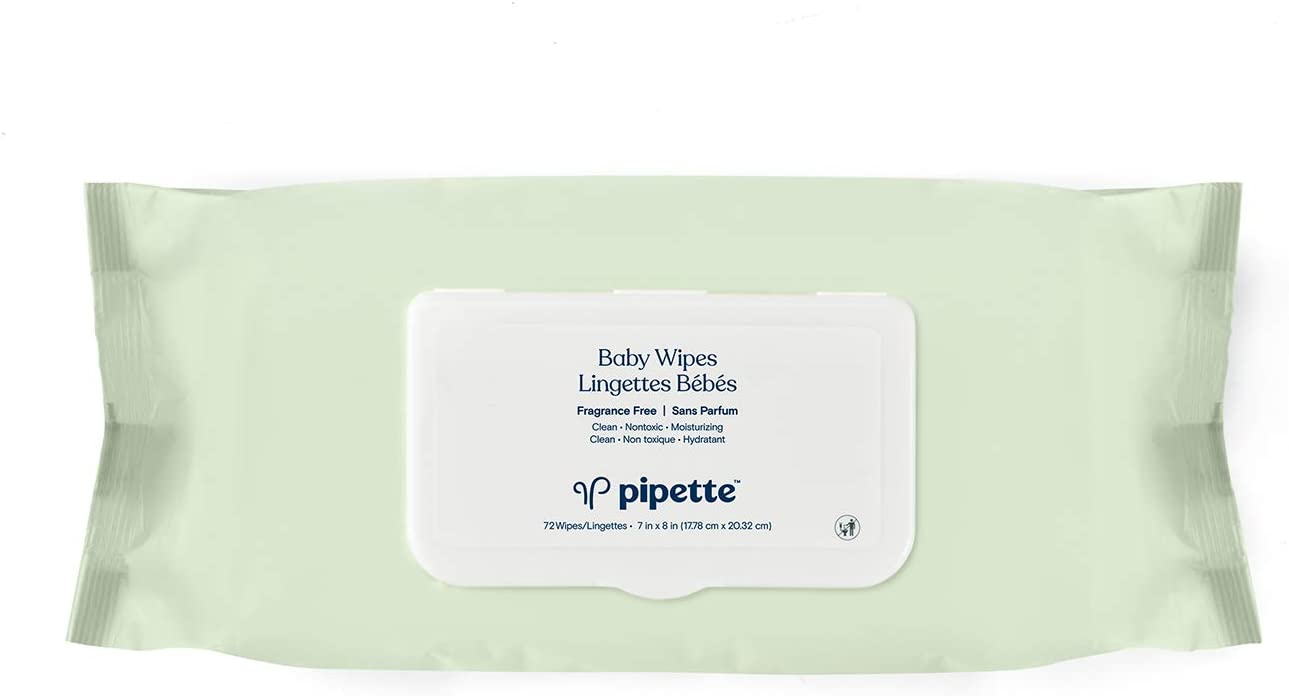
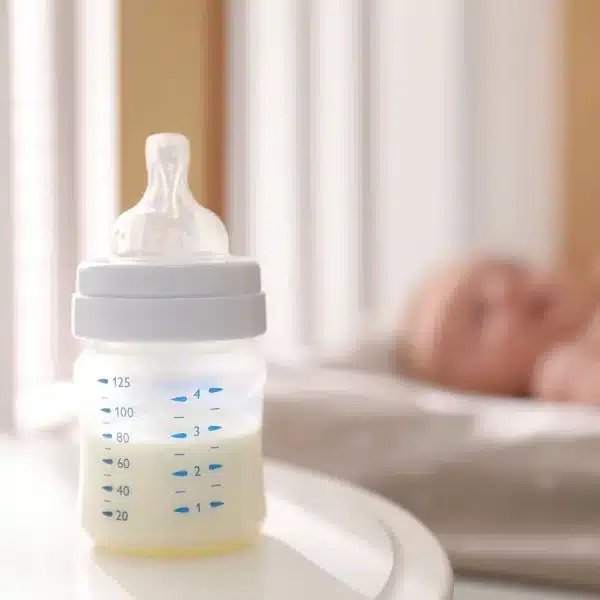
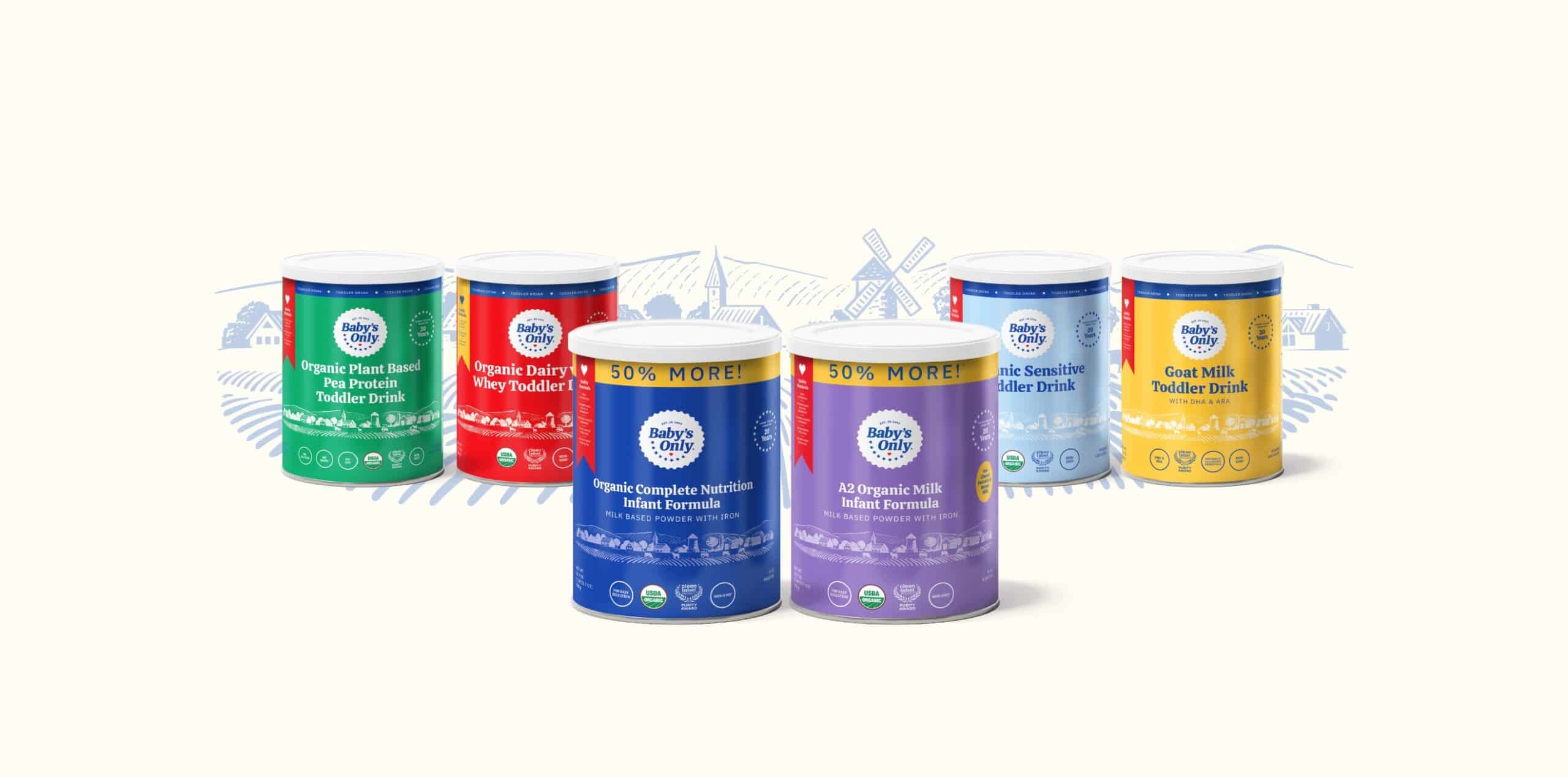

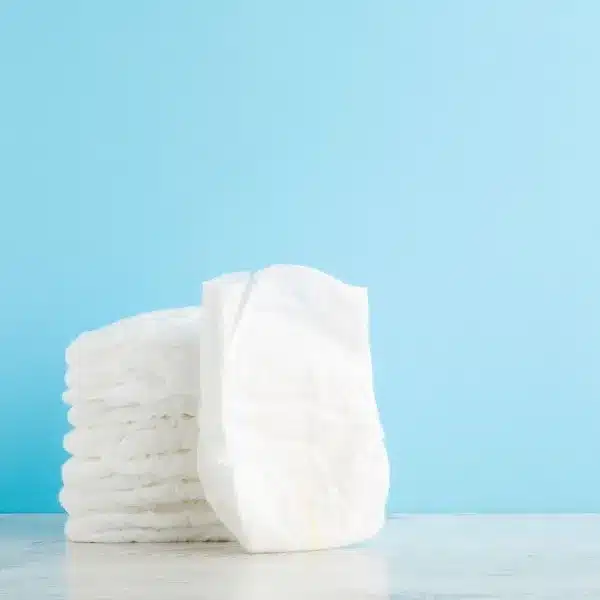
Leave a Reply
You must be logged in to post a comment.